Effectiveness of Talent Management Strategies in Retaining and Attracting High Performance Team Leaders
VerifiedAdded on 2022/12/26
|35
|7662
|71
AI Summary
This research report evaluates the effectiveness of talent management strategies used by organizations to retain and attract high performance team leaders. It explores different strategies, their importance, and the issues faced by organizations. The report also provides insights into the research methodology and recommendations for improving talent management strategies. Find relevant study material and assignments on Desklib.
Contribute Materials
Your contribution can guide someone’s learning journey. Share your
documents today.
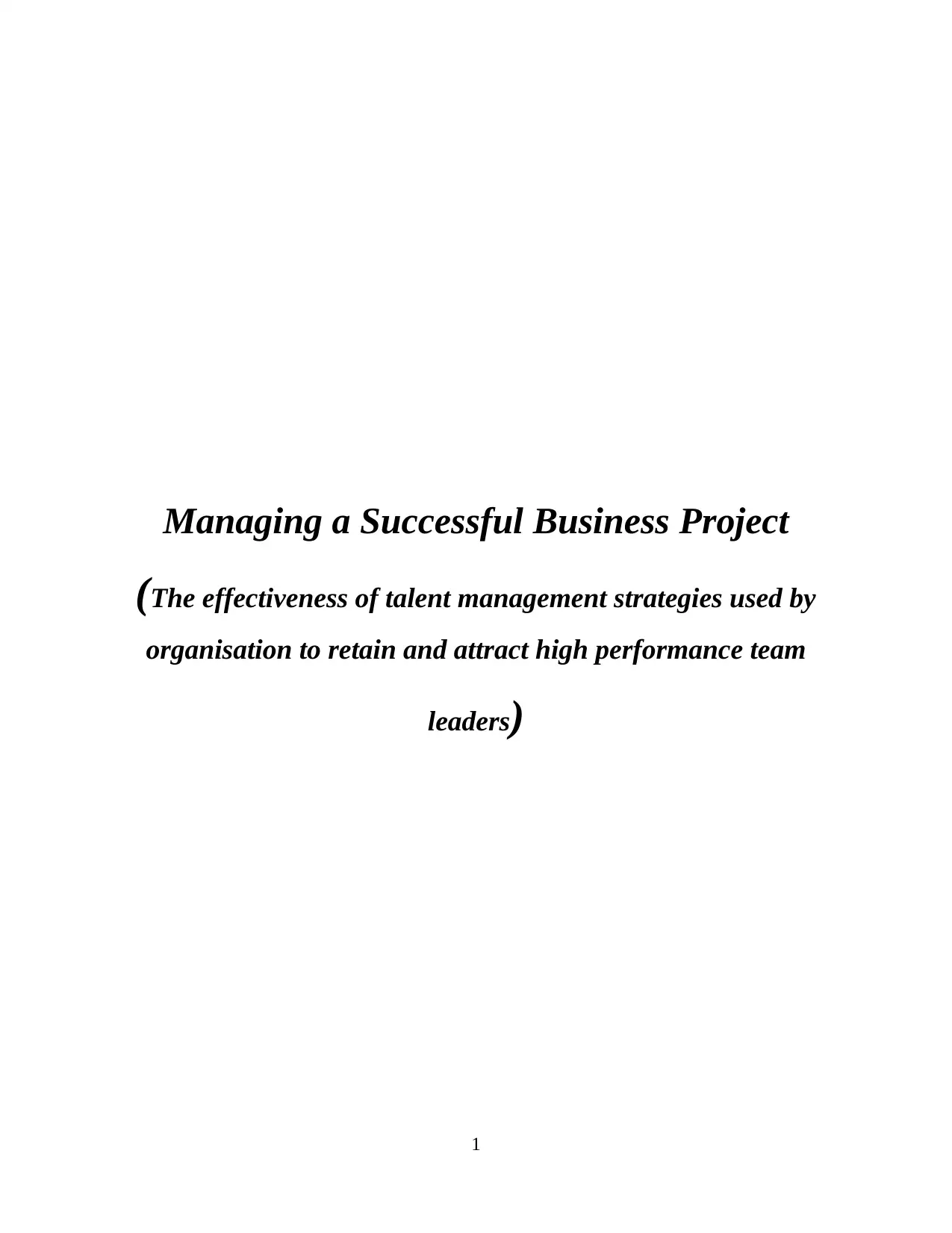
Managing a Successful Business Project
(The effectiveness of talent management strategies used by
organisation to retain and attract high performance team
leaders)
1
(The effectiveness of talent management strategies used by
organisation to retain and attract high performance team
leaders)
1
Secure Best Marks with AI Grader
Need help grading? Try our AI Grader for instant feedback on your assignments.
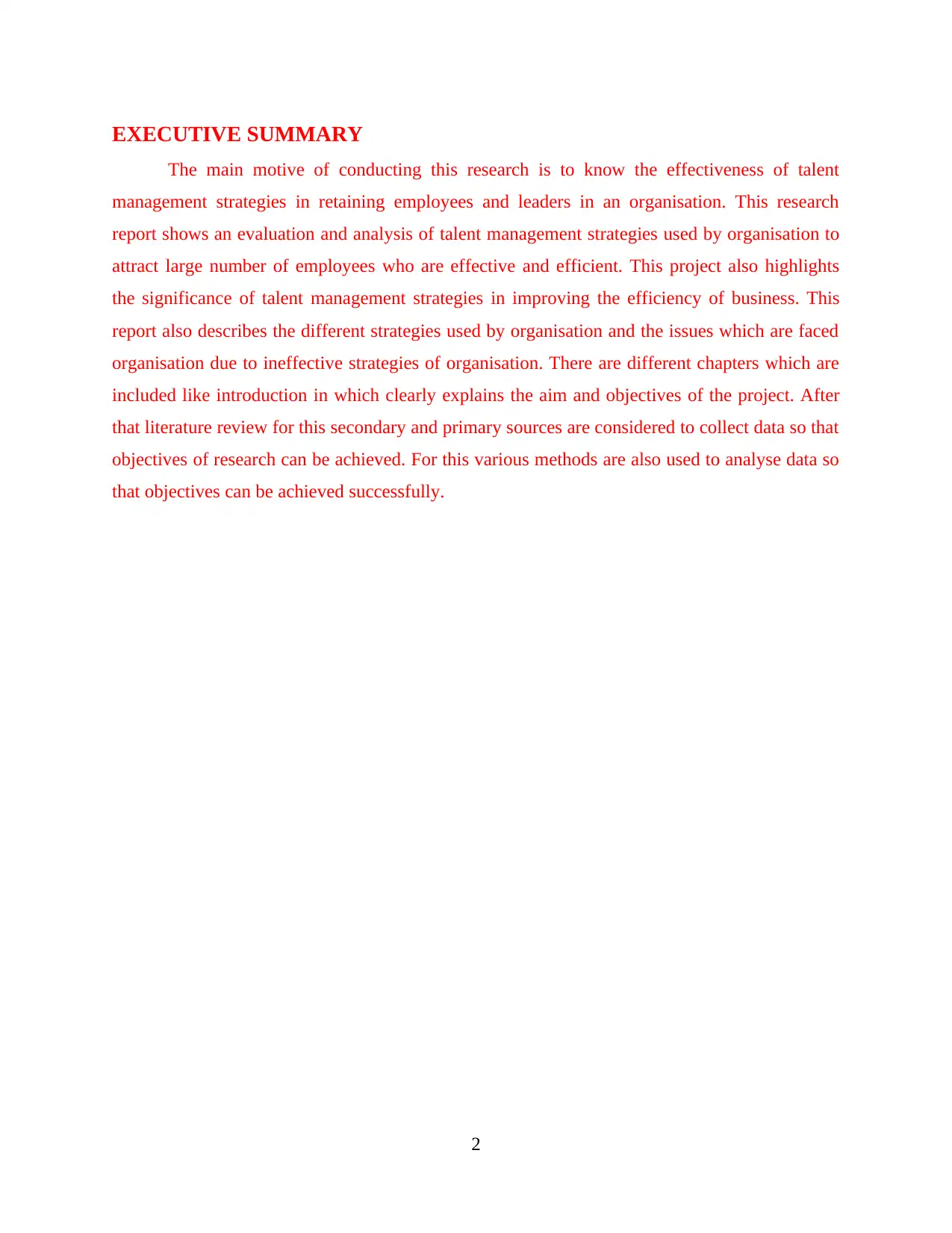
EXECUTIVE SUMMARY
The main motive of conducting this research is to know the effectiveness of talent
management strategies in retaining employees and leaders in an organisation. This research
report shows an evaluation and analysis of talent management strategies used by organisation to
attract large number of employees who are effective and efficient. This project also highlights
the significance of talent management strategies in improving the efficiency of business. This
report also describes the different strategies used by organisation and the issues which are faced
organisation due to ineffective strategies of organisation. There are different chapters which are
included like introduction in which clearly explains the aim and objectives of the project. After
that literature review for this secondary and primary sources are considered to collect data so that
objectives of research can be achieved. For this various methods are also used to analyse data so
that objectives can be achieved successfully.
2
The main motive of conducting this research is to know the effectiveness of talent
management strategies in retaining employees and leaders in an organisation. This research
report shows an evaluation and analysis of talent management strategies used by organisation to
attract large number of employees who are effective and efficient. This project also highlights
the significance of talent management strategies in improving the efficiency of business. This
report also describes the different strategies used by organisation and the issues which are faced
organisation due to ineffective strategies of organisation. There are different chapters which are
included like introduction in which clearly explains the aim and objectives of the project. After
that literature review for this secondary and primary sources are considered to collect data so that
objectives of research can be achieved. For this various methods are also used to analyse data so
that objectives can be achieved successfully.
2
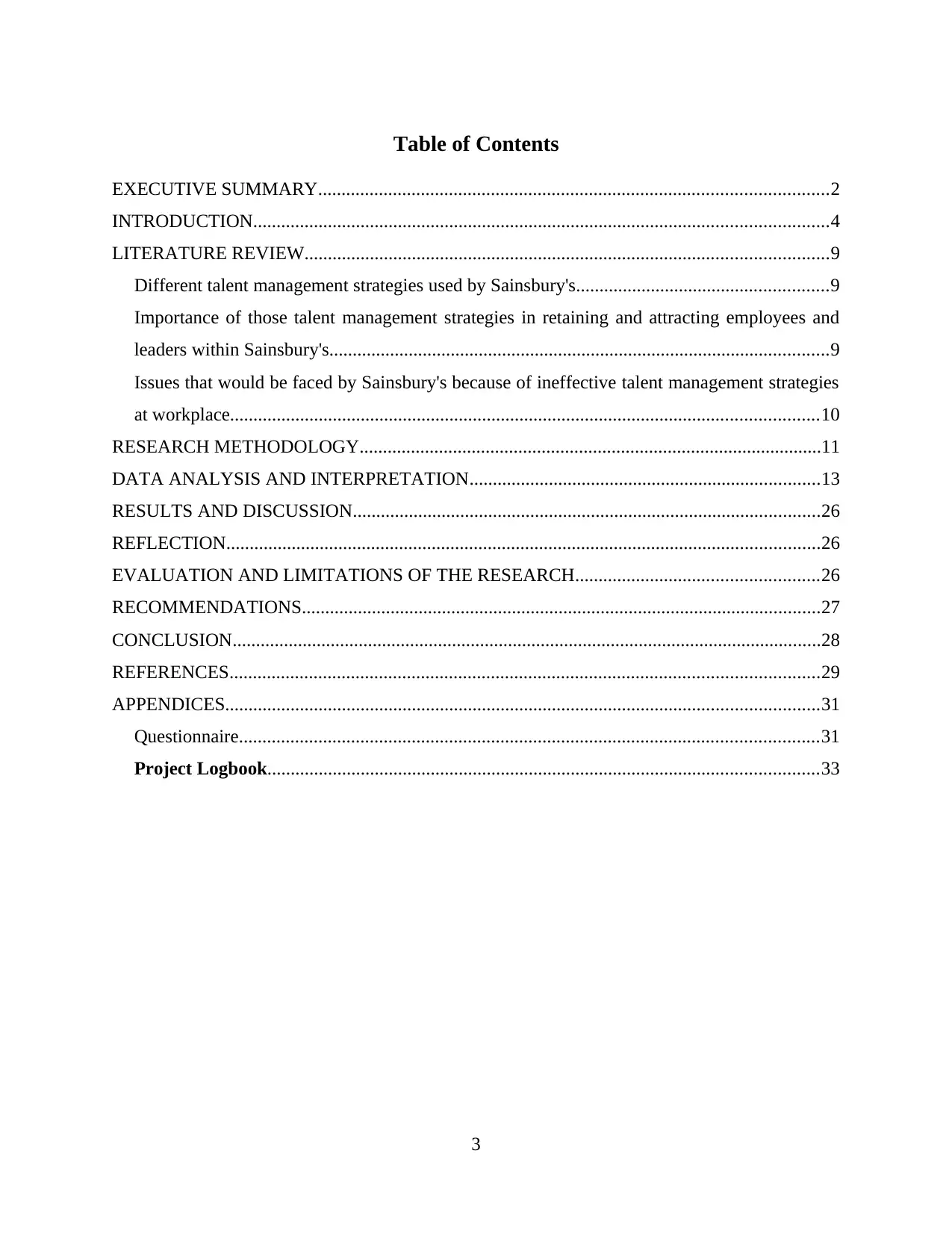
Table of Contents
EXECUTIVE SUMMARY.............................................................................................................2
INTRODUCTION...........................................................................................................................4
LITERATURE REVIEW................................................................................................................9
Different talent management strategies used by Sainsbury's......................................................9
Importance of those talent management strategies in retaining and attracting employees and
leaders within Sainsbury's...........................................................................................................9
Issues that would be faced by Sainsbury's because of ineffective talent management strategies
at workplace..............................................................................................................................10
RESEARCH METHODOLOGY...................................................................................................11
DATA ANALYSIS AND INTERPRETATION...........................................................................13
RESULTS AND DISCUSSION....................................................................................................26
REFLECTION...............................................................................................................................26
EVALUATION AND LIMITATIONS OF THE RESEARCH....................................................26
RECOMMENDATIONS...............................................................................................................27
CONCLUSION..............................................................................................................................28
REFERENCES..............................................................................................................................29
APPENDICES...............................................................................................................................31
Questionnaire............................................................................................................................31
Project Logbook......................................................................................................................33
3
EXECUTIVE SUMMARY.............................................................................................................2
INTRODUCTION...........................................................................................................................4
LITERATURE REVIEW................................................................................................................9
Different talent management strategies used by Sainsbury's......................................................9
Importance of those talent management strategies in retaining and attracting employees and
leaders within Sainsbury's...........................................................................................................9
Issues that would be faced by Sainsbury's because of ineffective talent management strategies
at workplace..............................................................................................................................10
RESEARCH METHODOLOGY...................................................................................................11
DATA ANALYSIS AND INTERPRETATION...........................................................................13
RESULTS AND DISCUSSION....................................................................................................26
REFLECTION...............................................................................................................................26
EVALUATION AND LIMITATIONS OF THE RESEARCH....................................................26
RECOMMENDATIONS...............................................................................................................27
CONCLUSION..............................................................................................................................28
REFERENCES..............................................................................................................................29
APPENDICES...............................................................................................................................31
Questionnaire............................................................................................................................31
Project Logbook......................................................................................................................33
3
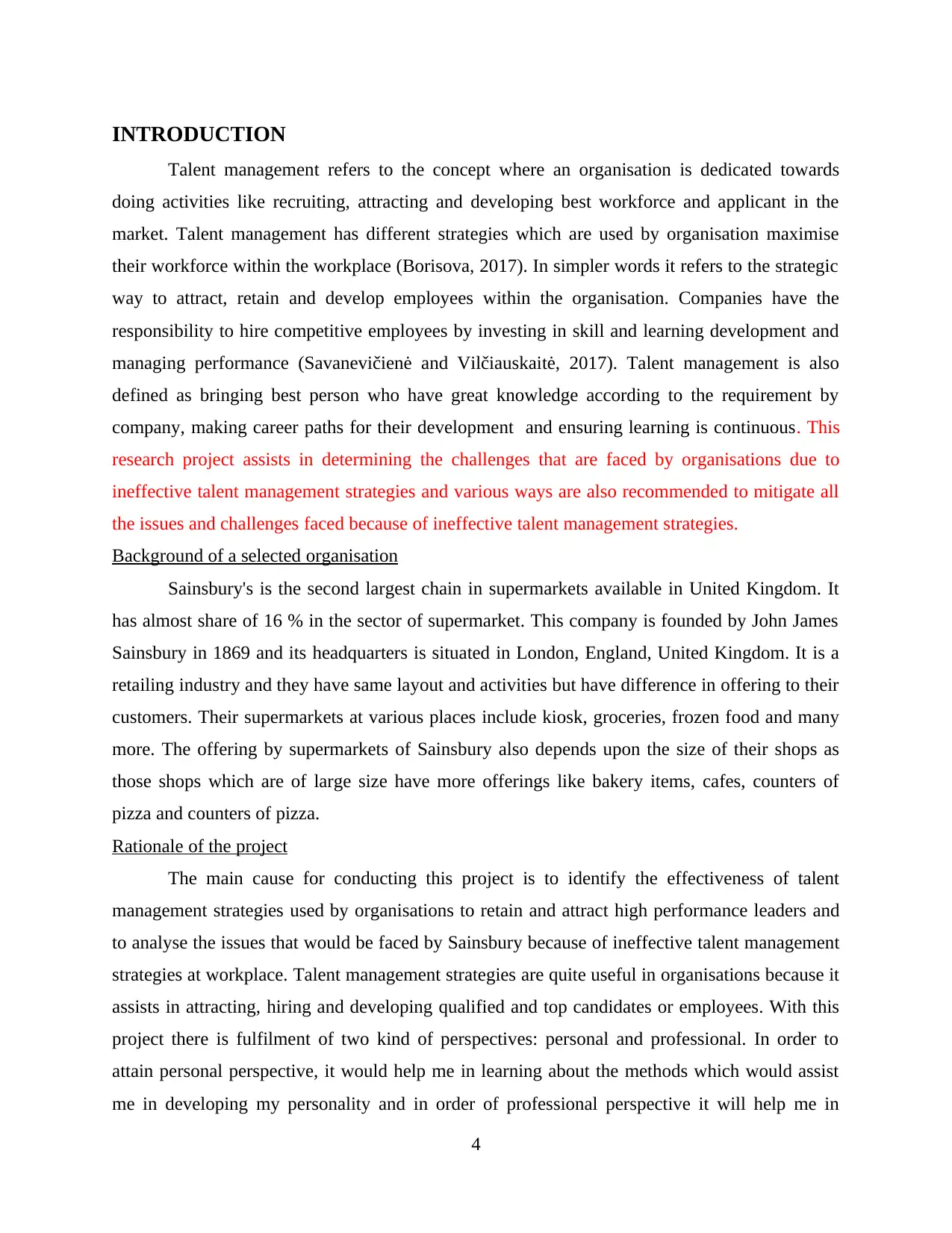
INTRODUCTION
Talent management refers to the concept where an organisation is dedicated towards
doing activities like recruiting, attracting and developing best workforce and applicant in the
market. Talent management has different strategies which are used by organisation maximise
their workforce within the workplace (Borisova, 2017). In simpler words it refers to the strategic
way to attract, retain and develop employees within the organisation. Companies have the
responsibility to hire competitive employees by investing in skill and learning development and
managing performance (Savanevičienė and Vilčiauskaitė, 2017). Talent management is also
defined as bringing best person who have great knowledge according to the requirement by
company, making career paths for their development and ensuring learning is continuous. This
research project assists in determining the challenges that are faced by organisations due to
ineffective talent management strategies and various ways are also recommended to mitigate all
the issues and challenges faced because of ineffective talent management strategies.
Background of a selected organisation
Sainsbury's is the second largest chain in supermarkets available in United Kingdom. It
has almost share of 16 % in the sector of supermarket. This company is founded by John James
Sainsbury in 1869 and its headquarters is situated in London, England, United Kingdom. It is a
retailing industry and they have same layout and activities but have difference in offering to their
customers. Their supermarkets at various places include kiosk, groceries, frozen food and many
more. The offering by supermarkets of Sainsbury also depends upon the size of their shops as
those shops which are of large size have more offerings like bakery items, cafes, counters of
pizza and counters of pizza.
Rationale of the project
The main cause for conducting this project is to identify the effectiveness of talent
management strategies used by organisations to retain and attract high performance leaders and
to analyse the issues that would be faced by Sainsbury because of ineffective talent management
strategies at workplace. Talent management strategies are quite useful in organisations because it
assists in attracting, hiring and developing qualified and top candidates or employees. With this
project there is fulfilment of two kind of perspectives: personal and professional. In order to
attain personal perspective, it would help me in learning about the methods which would assist
me in developing my personality and in order of professional perspective it will help me in
4
Talent management refers to the concept where an organisation is dedicated towards
doing activities like recruiting, attracting and developing best workforce and applicant in the
market. Talent management has different strategies which are used by organisation maximise
their workforce within the workplace (Borisova, 2017). In simpler words it refers to the strategic
way to attract, retain and develop employees within the organisation. Companies have the
responsibility to hire competitive employees by investing in skill and learning development and
managing performance (Savanevičienė and Vilčiauskaitė, 2017). Talent management is also
defined as bringing best person who have great knowledge according to the requirement by
company, making career paths for their development and ensuring learning is continuous. This
research project assists in determining the challenges that are faced by organisations due to
ineffective talent management strategies and various ways are also recommended to mitigate all
the issues and challenges faced because of ineffective talent management strategies.
Background of a selected organisation
Sainsbury's is the second largest chain in supermarkets available in United Kingdom. It
has almost share of 16 % in the sector of supermarket. This company is founded by John James
Sainsbury in 1869 and its headquarters is situated in London, England, United Kingdom. It is a
retailing industry and they have same layout and activities but have difference in offering to their
customers. Their supermarkets at various places include kiosk, groceries, frozen food and many
more. The offering by supermarkets of Sainsbury also depends upon the size of their shops as
those shops which are of large size have more offerings like bakery items, cafes, counters of
pizza and counters of pizza.
Rationale of the project
The main cause for conducting this project is to identify the effectiveness of talent
management strategies used by organisations to retain and attract high performance leaders and
to analyse the issues that would be faced by Sainsbury because of ineffective talent management
strategies at workplace. Talent management strategies are quite useful in organisations because it
assists in attracting, hiring and developing qualified and top candidates or employees. With this
project there is fulfilment of two kind of perspectives: personal and professional. In order to
attain personal perspective, it would help me in learning about the methods which would assist
me in developing my personality and in order of professional perspective it will help me in
4
Secure Best Marks with AI Grader
Need help grading? Try our AI Grader for instant feedback on your assignments.
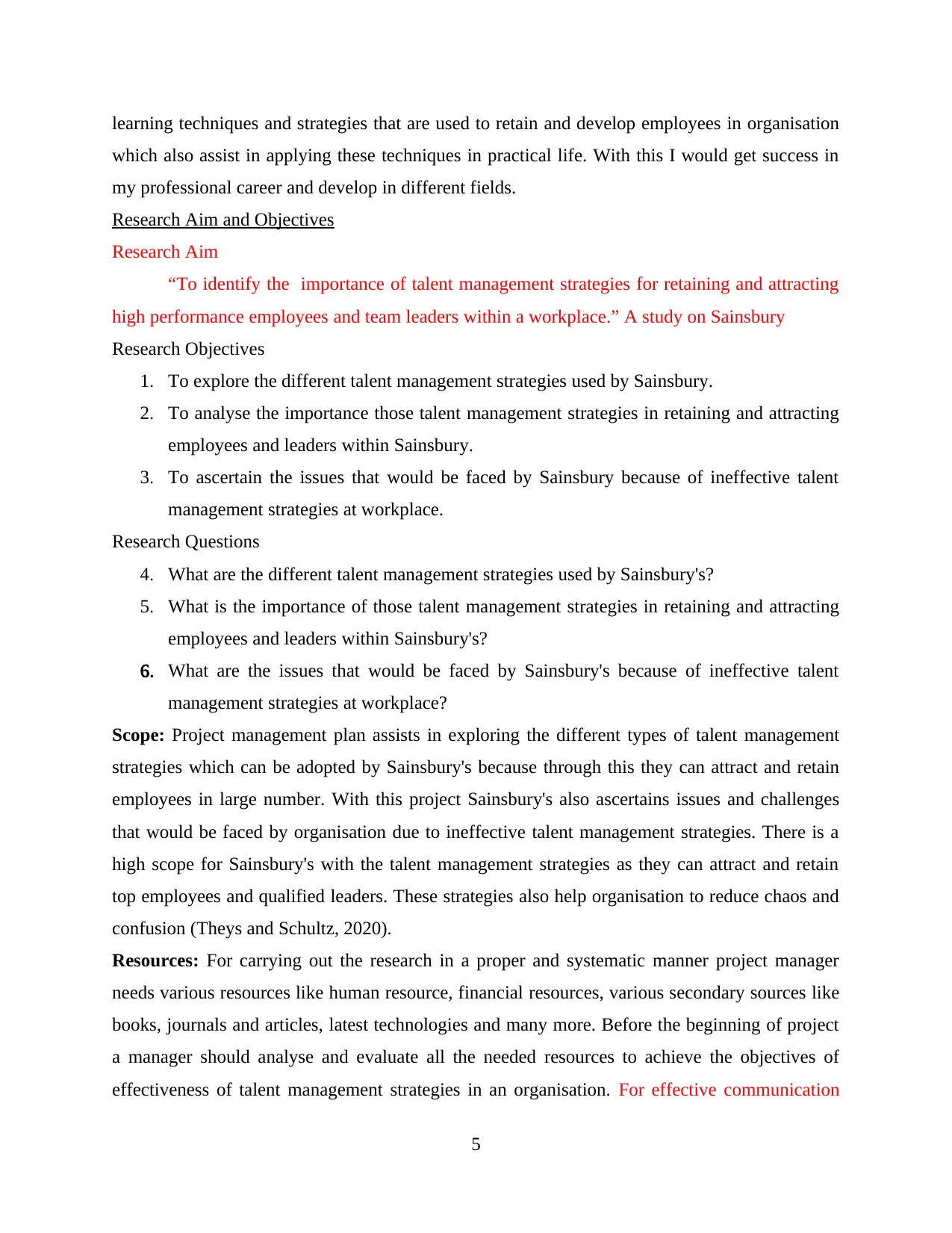
learning techniques and strategies that are used to retain and develop employees in organisation
which also assist in applying these techniques in practical life. With this I would get success in
my professional career and develop in different fields.
Research Aim and Objectives
Research Aim
“To identify the importance of talent management strategies for retaining and attracting
high performance employees and team leaders within a workplace.” A study on Sainsbury
Research Objectives
1. To explore the different talent management strategies used by Sainsbury.
2. To analyse the importance those talent management strategies in retaining and attracting
employees and leaders within Sainsbury.
3. To ascertain the issues that would be faced by Sainsbury because of ineffective talent
management strategies at workplace.
Research Questions
4. What are the different talent management strategies used by Sainsbury's?
5. What is the importance of those talent management strategies in retaining and attracting
employees and leaders within Sainsbury's?
6. What are the issues that would be faced by Sainsbury's because of ineffective talent
management strategies at workplace?
Scope: Project management plan assists in exploring the different types of talent management
strategies which can be adopted by Sainsbury's because through this they can attract and retain
employees in large number. With this project Sainsbury's also ascertains issues and challenges
that would be faced by organisation due to ineffective talent management strategies. There is a
high scope for Sainsbury's with the talent management strategies as they can attract and retain
top employees and qualified leaders. These strategies also help organisation to reduce chaos and
confusion (Theys and Schultz, 2020).
Resources: For carrying out the research in a proper and systematic manner project manager
needs various resources like human resource, financial resources, various secondary sources like
books, journals and articles, latest technologies and many more. Before the beginning of project
a manager should analyse and evaluate all the needed resources to achieve the objectives of
effectiveness of talent management strategies in an organisation. For effective communication
5
which also assist in applying these techniques in practical life. With this I would get success in
my professional career and develop in different fields.
Research Aim and Objectives
Research Aim
“To identify the importance of talent management strategies for retaining and attracting
high performance employees and team leaders within a workplace.” A study on Sainsbury
Research Objectives
1. To explore the different talent management strategies used by Sainsbury.
2. To analyse the importance those talent management strategies in retaining and attracting
employees and leaders within Sainsbury.
3. To ascertain the issues that would be faced by Sainsbury because of ineffective talent
management strategies at workplace.
Research Questions
4. What are the different talent management strategies used by Sainsbury's?
5. What is the importance of those talent management strategies in retaining and attracting
employees and leaders within Sainsbury's?
6. What are the issues that would be faced by Sainsbury's because of ineffective talent
management strategies at workplace?
Scope: Project management plan assists in exploring the different types of talent management
strategies which can be adopted by Sainsbury's because through this they can attract and retain
employees in large number. With this project Sainsbury's also ascertains issues and challenges
that would be faced by organisation due to ineffective talent management strategies. There is a
high scope for Sainsbury's with the talent management strategies as they can attract and retain
top employees and qualified leaders. These strategies also help organisation to reduce chaos and
confusion (Theys and Schultz, 2020).
Resources: For carrying out the research in a proper and systematic manner project manager
needs various resources like human resource, financial resources, various secondary sources like
books, journals and articles, latest technologies and many more. Before the beginning of project
a manager should analyse and evaluate all the needed resources to achieve the objectives of
effectiveness of talent management strategies in an organisation. For effective communication
5
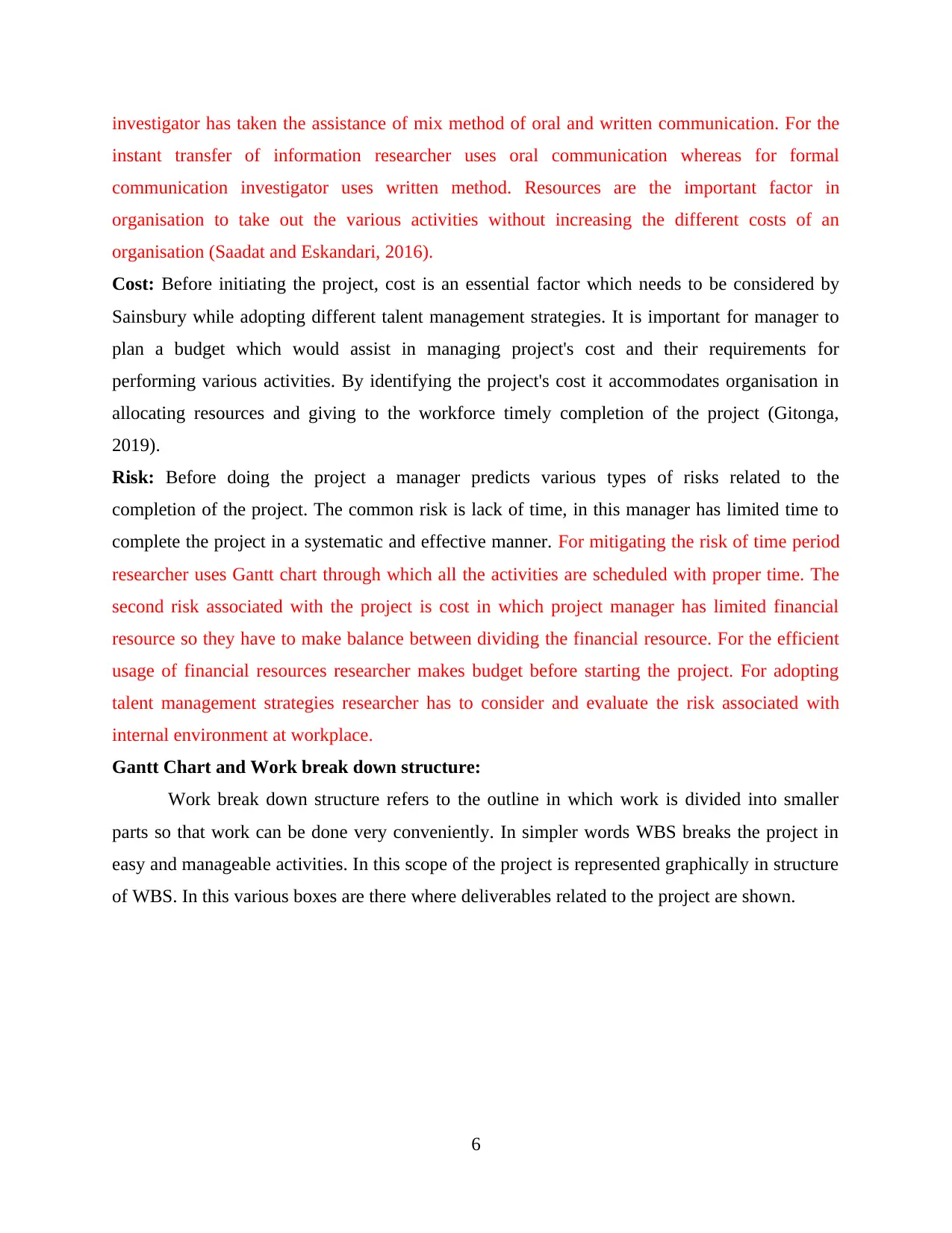
investigator has taken the assistance of mix method of oral and written communication. For the
instant transfer of information researcher uses oral communication whereas for formal
communication investigator uses written method. Resources are the important factor in
organisation to take out the various activities without increasing the different costs of an
organisation (Saadat and Eskandari, 2016).
Cost: Before initiating the project, cost is an essential factor which needs to be considered by
Sainsbury while adopting different talent management strategies. It is important for manager to
plan a budget which would assist in managing project's cost and their requirements for
performing various activities. By identifying the project's cost it accommodates organisation in
allocating resources and giving to the workforce timely completion of the project (Gitonga,
2019).
Risk: Before doing the project a manager predicts various types of risks related to the
completion of the project. The common risk is lack of time, in this manager has limited time to
complete the project in a systematic and effective manner. For mitigating the risk of time period
researcher uses Gantt chart through which all the activities are scheduled with proper time. The
second risk associated with the project is cost in which project manager has limited financial
resource so they have to make balance between dividing the financial resource. For the efficient
usage of financial resources researcher makes budget before starting the project. For adopting
talent management strategies researcher has to consider and evaluate the risk associated with
internal environment at workplace.
Gantt Chart and Work break down structure:
Work break down structure refers to the outline in which work is divided into smaller
parts so that work can be done very conveniently. In simpler words WBS breaks the project in
easy and manageable activities. In this scope of the project is represented graphically in structure
of WBS. In this various boxes are there where deliverables related to the project are shown.
6
instant transfer of information researcher uses oral communication whereas for formal
communication investigator uses written method. Resources are the important factor in
organisation to take out the various activities without increasing the different costs of an
organisation (Saadat and Eskandari, 2016).
Cost: Before initiating the project, cost is an essential factor which needs to be considered by
Sainsbury while adopting different talent management strategies. It is important for manager to
plan a budget which would assist in managing project's cost and their requirements for
performing various activities. By identifying the project's cost it accommodates organisation in
allocating resources and giving to the workforce timely completion of the project (Gitonga,
2019).
Risk: Before doing the project a manager predicts various types of risks related to the
completion of the project. The common risk is lack of time, in this manager has limited time to
complete the project in a systematic and effective manner. For mitigating the risk of time period
researcher uses Gantt chart through which all the activities are scheduled with proper time. The
second risk associated with the project is cost in which project manager has limited financial
resource so they have to make balance between dividing the financial resource. For the efficient
usage of financial resources researcher makes budget before starting the project. For adopting
talent management strategies researcher has to consider and evaluate the risk associated with
internal environment at workplace.
Gantt Chart and Work break down structure:
Work break down structure refers to the outline in which work is divided into smaller
parts so that work can be done very conveniently. In simpler words WBS breaks the project in
easy and manageable activities. In this scope of the project is represented graphically in structure
of WBS. In this various boxes are there where deliverables related to the project are shown.
6
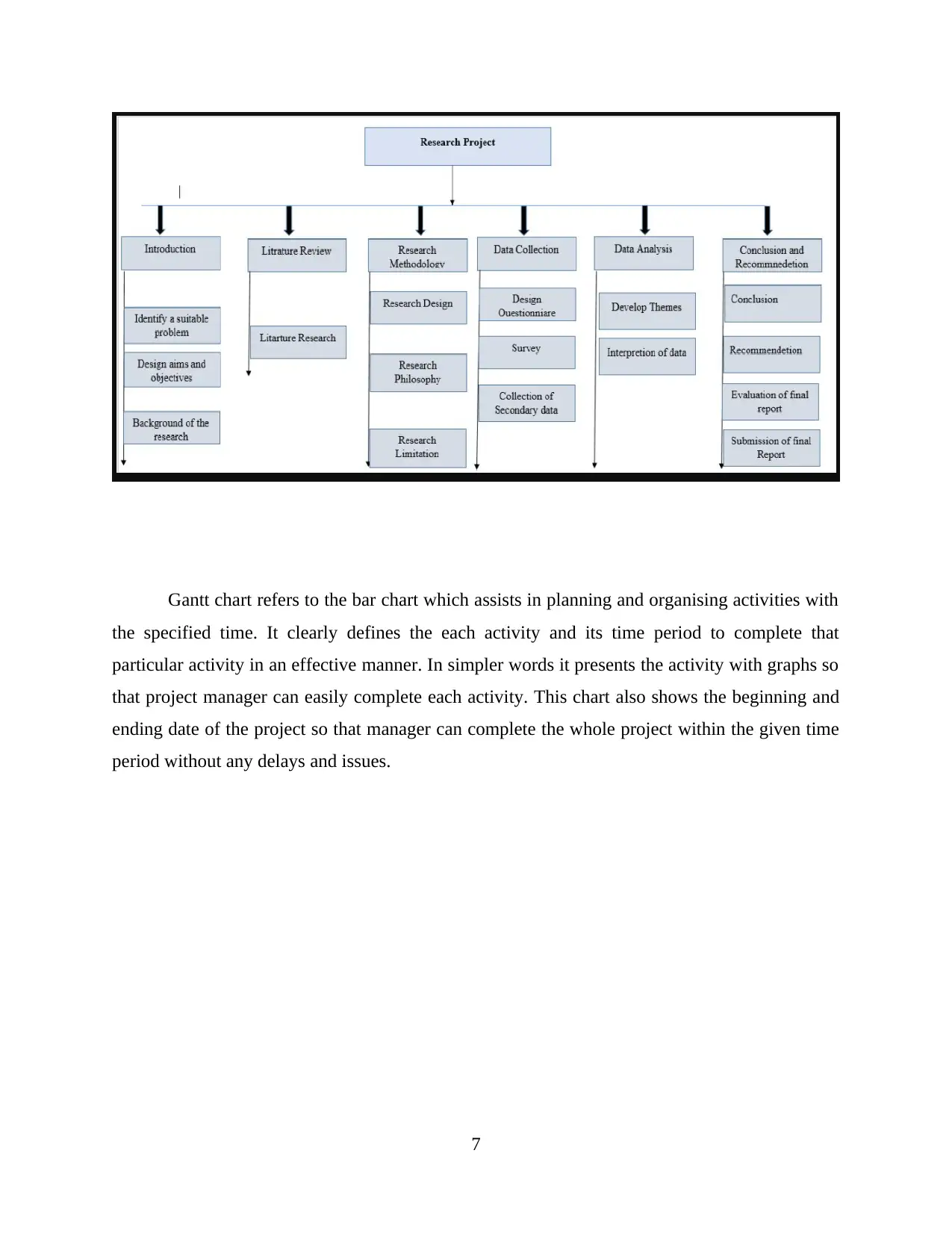
Gantt chart refers to the bar chart which assists in planning and organising activities with
the specified time. It clearly defines the each activity and its time period to complete that
particular activity in an effective manner. In simpler words it presents the activity with graphs so
that project manager can easily complete each activity. This chart also shows the beginning and
ending date of the project so that manager can complete the whole project within the given time
period without any delays and issues.
7
the specified time. It clearly defines the each activity and its time period to complete that
particular activity in an effective manner. In simpler words it presents the activity with graphs so
that project manager can easily complete each activity. This chart also shows the beginning and
ending date of the project so that manager can complete the whole project within the given time
period without any delays and issues.
7
Paraphrase This Document
Need a fresh take? Get an instant paraphrase of this document with our AI Paraphraser
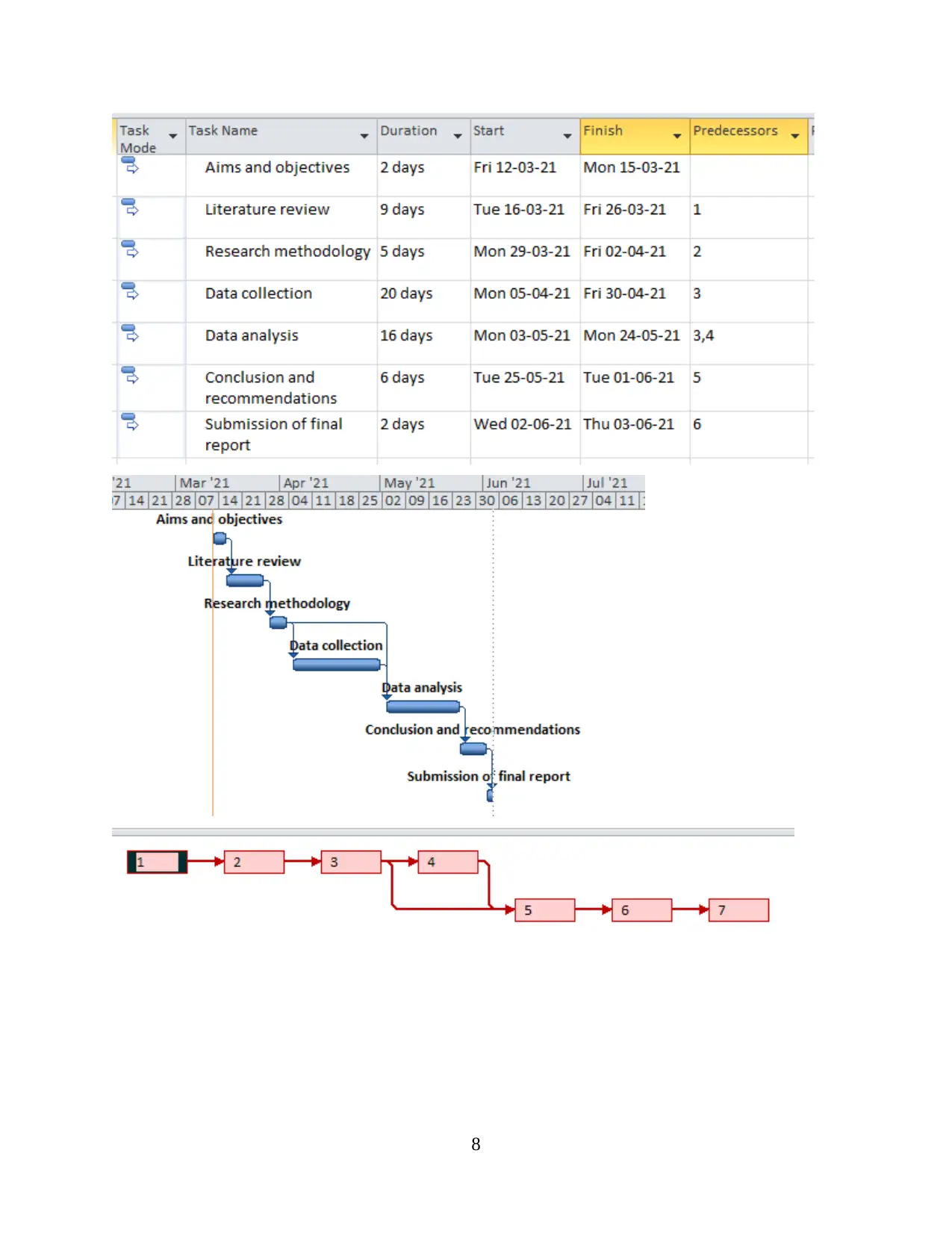
8
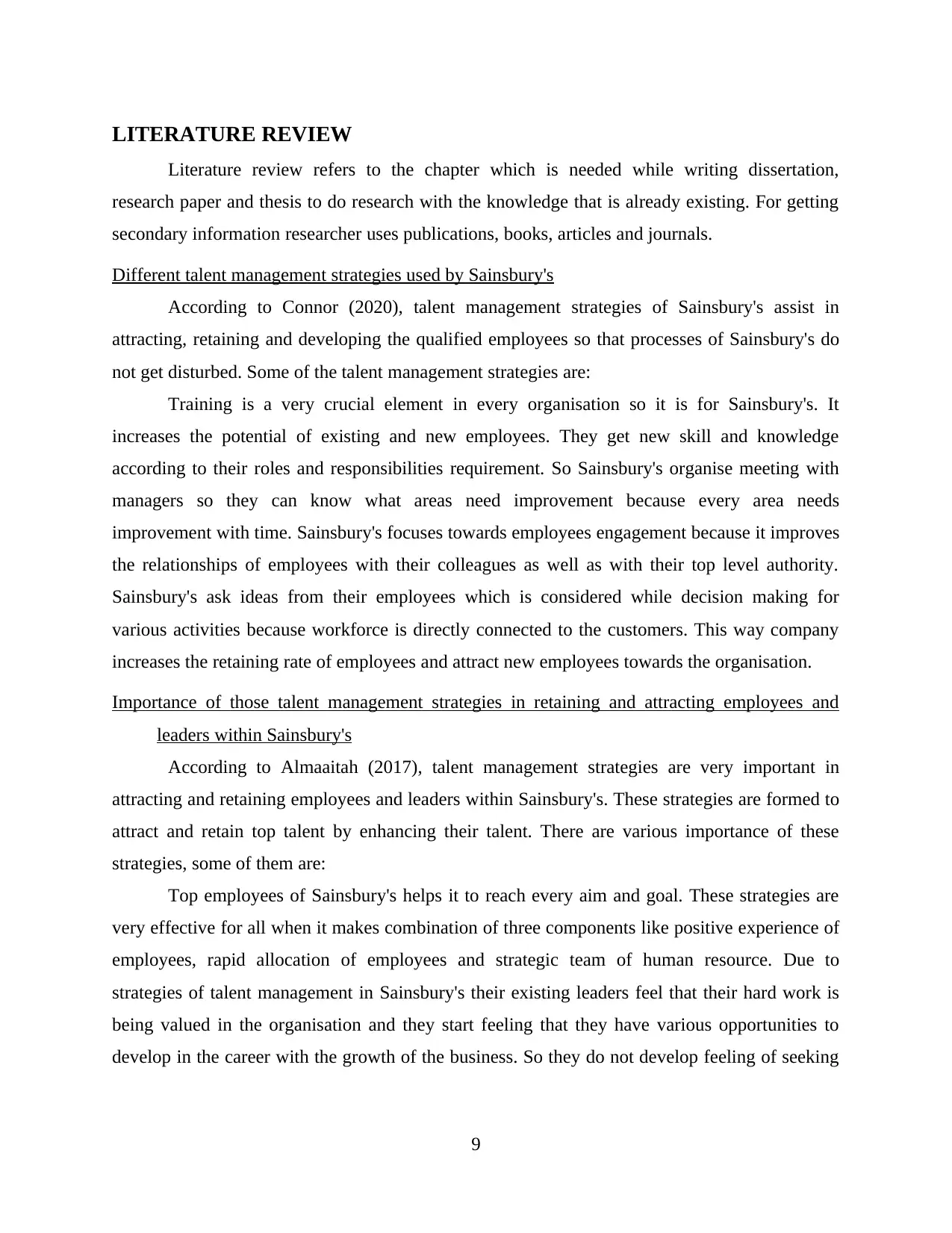
LITERATURE REVIEW
Literature review refers to the chapter which is needed while writing dissertation,
research paper and thesis to do research with the knowledge that is already existing. For getting
secondary information researcher uses publications, books, articles and journals.
Different talent management strategies used by Sainsbury's
According to Connor (2020), talent management strategies of Sainsbury's assist in
attracting, retaining and developing the qualified employees so that processes of Sainsbury's do
not get disturbed. Some of the talent management strategies are:
Training is a very crucial element in every organisation so it is for Sainsbury's. It
increases the potential of existing and new employees. They get new skill and knowledge
according to their roles and responsibilities requirement. So Sainsbury's organise meeting with
managers so they can know what areas need improvement because every area needs
improvement with time. Sainsbury's focuses towards employees engagement because it improves
the relationships of employees with their colleagues as well as with their top level authority.
Sainsbury's ask ideas from their employees which is considered while decision making for
various activities because workforce is directly connected to the customers. This way company
increases the retaining rate of employees and attract new employees towards the organisation.
Importance of those talent management strategies in retaining and attracting employees and
leaders within Sainsbury's
According to Almaaitah (2017), talent management strategies are very important in
attracting and retaining employees and leaders within Sainsbury's. These strategies are formed to
attract and retain top talent by enhancing their talent. There are various importance of these
strategies, some of them are:
Top employees of Sainsbury's helps it to reach every aim and goal. These strategies are
very effective for all when it makes combination of three components like positive experience of
employees, rapid allocation of employees and strategic team of human resource. Due to
strategies of talent management in Sainsbury's their existing leaders feel that their hard work is
being valued in the organisation and they start feeling that they have various opportunities to
develop in the career with the growth of the business. So they do not develop feeling of seeking
9
Literature review refers to the chapter which is needed while writing dissertation,
research paper and thesis to do research with the knowledge that is already existing. For getting
secondary information researcher uses publications, books, articles and journals.
Different talent management strategies used by Sainsbury's
According to Connor (2020), talent management strategies of Sainsbury's assist in
attracting, retaining and developing the qualified employees so that processes of Sainsbury's do
not get disturbed. Some of the talent management strategies are:
Training is a very crucial element in every organisation so it is for Sainsbury's. It
increases the potential of existing and new employees. They get new skill and knowledge
according to their roles and responsibilities requirement. So Sainsbury's organise meeting with
managers so they can know what areas need improvement because every area needs
improvement with time. Sainsbury's focuses towards employees engagement because it improves
the relationships of employees with their colleagues as well as with their top level authority.
Sainsbury's ask ideas from their employees which is considered while decision making for
various activities because workforce is directly connected to the customers. This way company
increases the retaining rate of employees and attract new employees towards the organisation.
Importance of those talent management strategies in retaining and attracting employees and
leaders within Sainsbury's
According to Almaaitah (2017), talent management strategies are very important in
attracting and retaining employees and leaders within Sainsbury's. These strategies are formed to
attract and retain top talent by enhancing their talent. There are various importance of these
strategies, some of them are:
Top employees of Sainsbury's helps it to reach every aim and goal. These strategies are
very effective for all when it makes combination of three components like positive experience of
employees, rapid allocation of employees and strategic team of human resource. Due to
strategies of talent management in Sainsbury's their existing leaders feel that their hard work is
being valued in the organisation and they start feeling that they have various opportunities to
develop in the career with the growth of the business. So they do not develop feeling of seeking
9
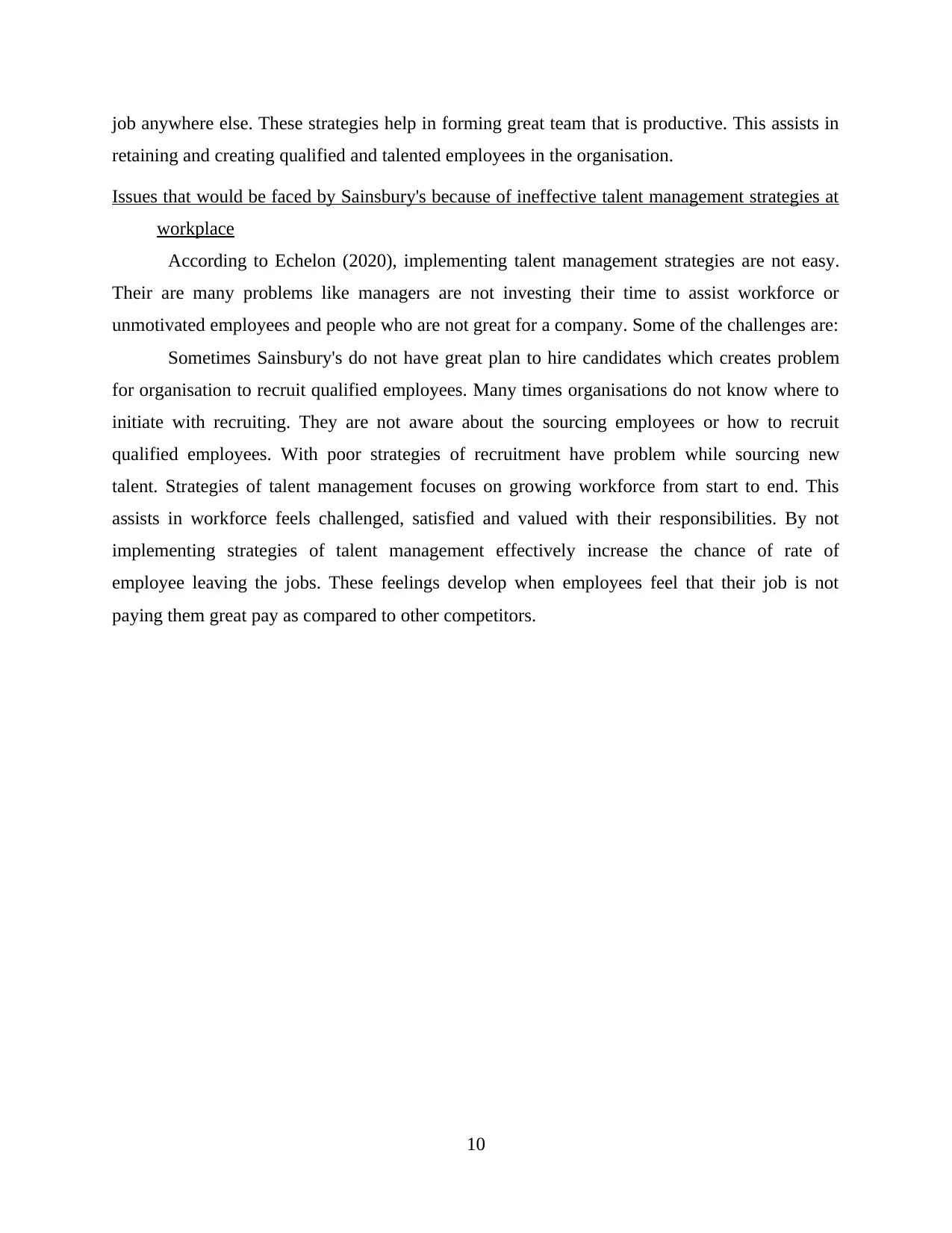
job anywhere else. These strategies help in forming great team that is productive. This assists in
retaining and creating qualified and talented employees in the organisation.
Issues that would be faced by Sainsbury's because of ineffective talent management strategies at
workplace
According to Echelon (2020), implementing talent management strategies are not easy.
Their are many problems like managers are not investing their time to assist workforce or
unmotivated employees and people who are not great for a company. Some of the challenges are:
Sometimes Sainsbury's do not have great plan to hire candidates which creates problem
for organisation to recruit qualified employees. Many times organisations do not know where to
initiate with recruiting. They are not aware about the sourcing employees or how to recruit
qualified employees. With poor strategies of recruitment have problem while sourcing new
talent. Strategies of talent management focuses on growing workforce from start to end. This
assists in workforce feels challenged, satisfied and valued with their responsibilities. By not
implementing strategies of talent management effectively increase the chance of rate of
employee leaving the jobs. These feelings develop when employees feel that their job is not
paying them great pay as compared to other competitors.
10
retaining and creating qualified and talented employees in the organisation.
Issues that would be faced by Sainsbury's because of ineffective talent management strategies at
workplace
According to Echelon (2020), implementing talent management strategies are not easy.
Their are many problems like managers are not investing their time to assist workforce or
unmotivated employees and people who are not great for a company. Some of the challenges are:
Sometimes Sainsbury's do not have great plan to hire candidates which creates problem
for organisation to recruit qualified employees. Many times organisations do not know where to
initiate with recruiting. They are not aware about the sourcing employees or how to recruit
qualified employees. With poor strategies of recruitment have problem while sourcing new
talent. Strategies of talent management focuses on growing workforce from start to end. This
assists in workforce feels challenged, satisfied and valued with their responsibilities. By not
implementing strategies of talent management effectively increase the chance of rate of
employee leaving the jobs. These feelings develop when employees feel that their job is not
paying them great pay as compared to other competitors.
10
Secure Best Marks with AI Grader
Need help grading? Try our AI Grader for instant feedback on your assignments.
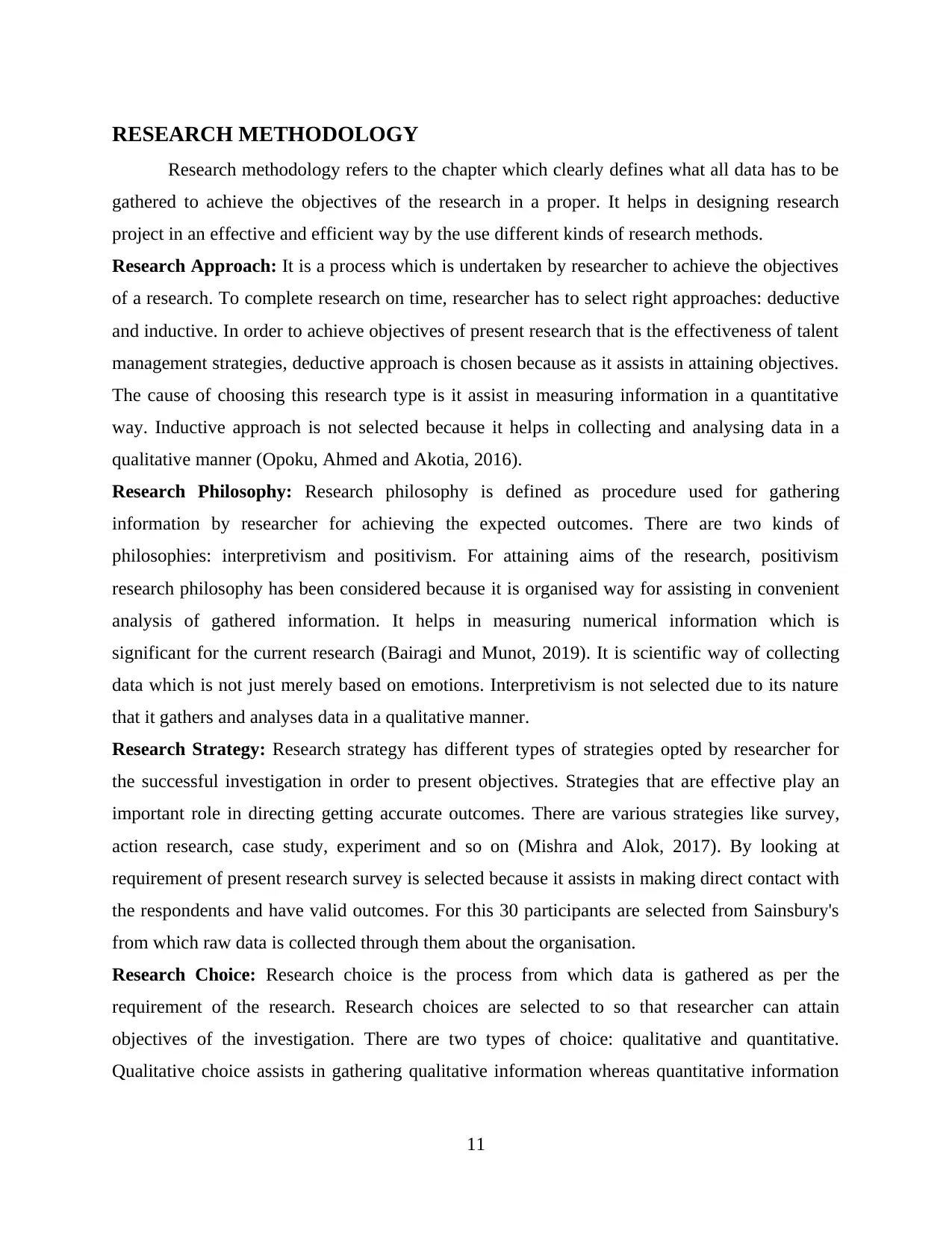
RESEARCH METHODOLOGY
Research methodology refers to the chapter which clearly defines what all data has to be
gathered to achieve the objectives of the research in a proper. It helps in designing research
project in an effective and efficient way by the use different kinds of research methods.
Research Approach: It is a process which is undertaken by researcher to achieve the objectives
of a research. To complete research on time, researcher has to select right approaches: deductive
and inductive. In order to achieve objectives of present research that is the effectiveness of talent
management strategies, deductive approach is chosen because as it assists in attaining objectives.
The cause of choosing this research type is it assist in measuring information in a quantitative
way. Inductive approach is not selected because it helps in collecting and analysing data in a
qualitative manner (Opoku, Ahmed and Akotia, 2016).
Research Philosophy: Research philosophy is defined as procedure used for gathering
information by researcher for achieving the expected outcomes. There are two kinds of
philosophies: interpretivism and positivism. For attaining aims of the research, positivism
research philosophy has been considered because it is organised way for assisting in convenient
analysis of gathered information. It helps in measuring numerical information which is
significant for the current research (Bairagi and Munot, 2019). It is scientific way of collecting
data which is not just merely based on emotions. Interpretivism is not selected due to its nature
that it gathers and analyses data in a qualitative manner.
Research Strategy: Research strategy has different types of strategies opted by researcher for
the successful investigation in order to present objectives. Strategies that are effective play an
important role in directing getting accurate outcomes. There are various strategies like survey,
action research, case study, experiment and so on (Mishra and Alok, 2017). By looking at
requirement of present research survey is selected because it assists in making direct contact with
the respondents and have valid outcomes. For this 30 participants are selected from Sainsbury's
from which raw data is collected through them about the organisation.
Research Choice: Research choice is the process from which data is gathered as per the
requirement of the research. Research choices are selected to so that researcher can attain
objectives of the investigation. There are two types of choice: qualitative and quantitative.
Qualitative choice assists in gathering qualitative information whereas quantitative information
11
Research methodology refers to the chapter which clearly defines what all data has to be
gathered to achieve the objectives of the research in a proper. It helps in designing research
project in an effective and efficient way by the use different kinds of research methods.
Research Approach: It is a process which is undertaken by researcher to achieve the objectives
of a research. To complete research on time, researcher has to select right approaches: deductive
and inductive. In order to achieve objectives of present research that is the effectiveness of talent
management strategies, deductive approach is chosen because as it assists in attaining objectives.
The cause of choosing this research type is it assist in measuring information in a quantitative
way. Inductive approach is not selected because it helps in collecting and analysing data in a
qualitative manner (Opoku, Ahmed and Akotia, 2016).
Research Philosophy: Research philosophy is defined as procedure used for gathering
information by researcher for achieving the expected outcomes. There are two kinds of
philosophies: interpretivism and positivism. For attaining aims of the research, positivism
research philosophy has been considered because it is organised way for assisting in convenient
analysis of gathered information. It helps in measuring numerical information which is
significant for the current research (Bairagi and Munot, 2019). It is scientific way of collecting
data which is not just merely based on emotions. Interpretivism is not selected due to its nature
that it gathers and analyses data in a qualitative manner.
Research Strategy: Research strategy has different types of strategies opted by researcher for
the successful investigation in order to present objectives. Strategies that are effective play an
important role in directing getting accurate outcomes. There are various strategies like survey,
action research, case study, experiment and so on (Mishra and Alok, 2017). By looking at
requirement of present research survey is selected because it assists in making direct contact with
the respondents and have valid outcomes. For this 30 participants are selected from Sainsbury's
from which raw data is collected through them about the organisation.
Research Choice: Research choice is the process from which data is gathered as per the
requirement of the research. Research choices are selected to so that researcher can attain
objectives of the investigation. There are two types of choice: qualitative and quantitative.
Qualitative choice assists in gathering qualitative information whereas quantitative information
11
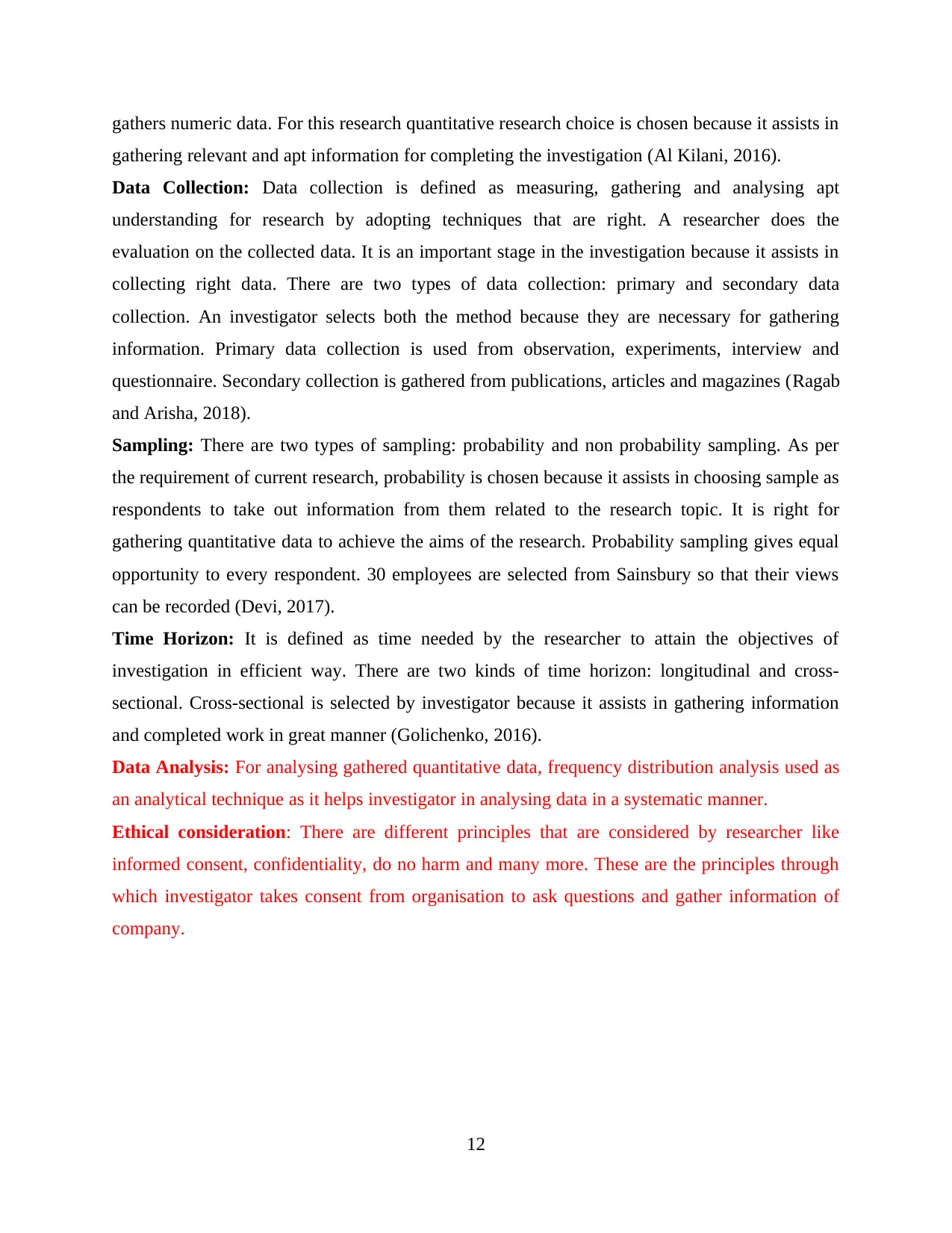
gathers numeric data. For this research quantitative research choice is chosen because it assists in
gathering relevant and apt information for completing the investigation (Al Kilani, 2016).
Data Collection: Data collection is defined as measuring, gathering and analysing apt
understanding for research by adopting techniques that are right. A researcher does the
evaluation on the collected data. It is an important stage in the investigation because it assists in
collecting right data. There are two types of data collection: primary and secondary data
collection. An investigator selects both the method because they are necessary for gathering
information. Primary data collection is used from observation, experiments, interview and
questionnaire. Secondary collection is gathered from publications, articles and magazines (Ragab
and Arisha, 2018).
Sampling: There are two types of sampling: probability and non probability sampling. As per
the requirement of current research, probability is chosen because it assists in choosing sample as
respondents to take out information from them related to the research topic. It is right for
gathering quantitative data to achieve the aims of the research. Probability sampling gives equal
opportunity to every respondent. 30 employees are selected from Sainsbury so that their views
can be recorded (Devi, 2017).
Time Horizon: It is defined as time needed by the researcher to attain the objectives of
investigation in efficient way. There are two kinds of time horizon: longitudinal and cross-
sectional. Cross-sectional is selected by investigator because it assists in gathering information
and completed work in great manner (Golichenko, 2016).
Data Analysis: For analysing gathered quantitative data, frequency distribution analysis used as
an analytical technique as it helps investigator in analysing data in a systematic manner.
Ethical consideration: There are different principles that are considered by researcher like
informed consent, confidentiality, do no harm and many more. These are the principles through
which investigator takes consent from organisation to ask questions and gather information of
company.
12
gathering relevant and apt information for completing the investigation (Al Kilani, 2016).
Data Collection: Data collection is defined as measuring, gathering and analysing apt
understanding for research by adopting techniques that are right. A researcher does the
evaluation on the collected data. It is an important stage in the investigation because it assists in
collecting right data. There are two types of data collection: primary and secondary data
collection. An investigator selects both the method because they are necessary for gathering
information. Primary data collection is used from observation, experiments, interview and
questionnaire. Secondary collection is gathered from publications, articles and magazines (Ragab
and Arisha, 2018).
Sampling: There are two types of sampling: probability and non probability sampling. As per
the requirement of current research, probability is chosen because it assists in choosing sample as
respondents to take out information from them related to the research topic. It is right for
gathering quantitative data to achieve the aims of the research. Probability sampling gives equal
opportunity to every respondent. 30 employees are selected from Sainsbury so that their views
can be recorded (Devi, 2017).
Time Horizon: It is defined as time needed by the researcher to attain the objectives of
investigation in efficient way. There are two kinds of time horizon: longitudinal and cross-
sectional. Cross-sectional is selected by investigator because it assists in gathering information
and completed work in great manner (Golichenko, 2016).
Data Analysis: For analysing gathered quantitative data, frequency distribution analysis used as
an analytical technique as it helps investigator in analysing data in a systematic manner.
Ethical consideration: There are different principles that are considered by researcher like
informed consent, confidentiality, do no harm and many more. These are the principles through
which investigator takes consent from organisation to ask questions and gather information of
company.
12
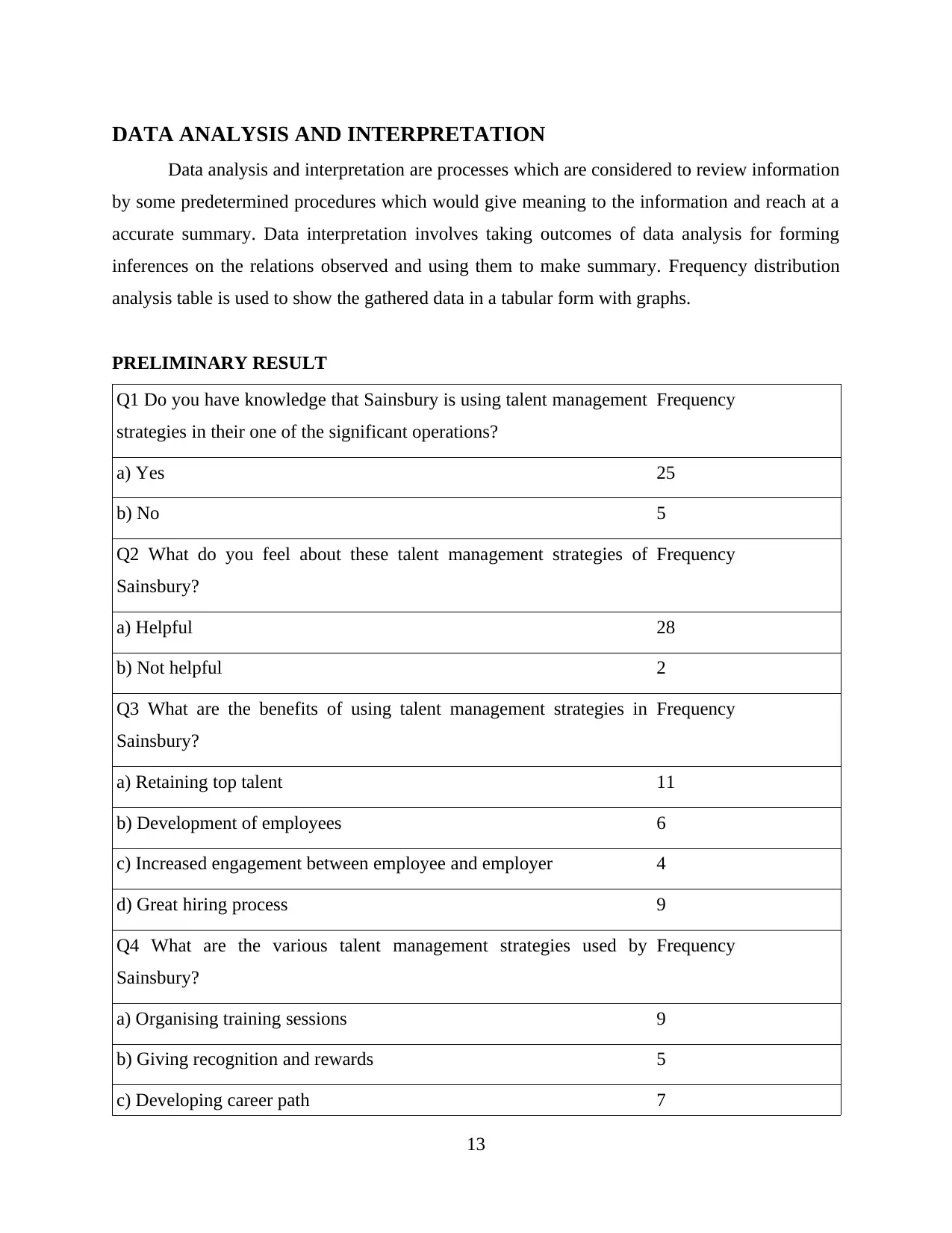
DATA ANALYSIS AND INTERPRETATION
Data analysis and interpretation are processes which are considered to review information
by some predetermined procedures which would give meaning to the information and reach at a
accurate summary. Data interpretation involves taking outcomes of data analysis for forming
inferences on the relations observed and using them to make summary. Frequency distribution
analysis table is used to show the gathered data in a tabular form with graphs.
PRELIMINARY RESULT
Q1 Do you have knowledge that Sainsbury is using talent management
strategies in their one of the significant operations?
Frequency
a) Yes 25
b) No 5
Q2 What do you feel about these talent management strategies of
Sainsbury?
Frequency
a) Helpful 28
b) Not helpful 2
Q3 What are the benefits of using talent management strategies in
Sainsbury?
Frequency
a) Retaining top talent 11
b) Development of employees 6
c) Increased engagement between employee and employer 4
d) Great hiring process 9
Q4 What are the various talent management strategies used by
Sainsbury?
Frequency
a) Organising training sessions 9
b) Giving recognition and rewards 5
c) Developing career path 7
13
Data analysis and interpretation are processes which are considered to review information
by some predetermined procedures which would give meaning to the information and reach at a
accurate summary. Data interpretation involves taking outcomes of data analysis for forming
inferences on the relations observed and using them to make summary. Frequency distribution
analysis table is used to show the gathered data in a tabular form with graphs.
PRELIMINARY RESULT
Q1 Do you have knowledge that Sainsbury is using talent management
strategies in their one of the significant operations?
Frequency
a) Yes 25
b) No 5
Q2 What do you feel about these talent management strategies of
Sainsbury?
Frequency
a) Helpful 28
b) Not helpful 2
Q3 What are the benefits of using talent management strategies in
Sainsbury?
Frequency
a) Retaining top talent 11
b) Development of employees 6
c) Increased engagement between employee and employer 4
d) Great hiring process 9
Q4 What are the various talent management strategies used by
Sainsbury?
Frequency
a) Organising training sessions 9
b) Giving recognition and rewards 5
c) Developing career path 7
13
Paraphrase This Document
Need a fresh take? Get an instant paraphrase of this document with our AI Paraphraser
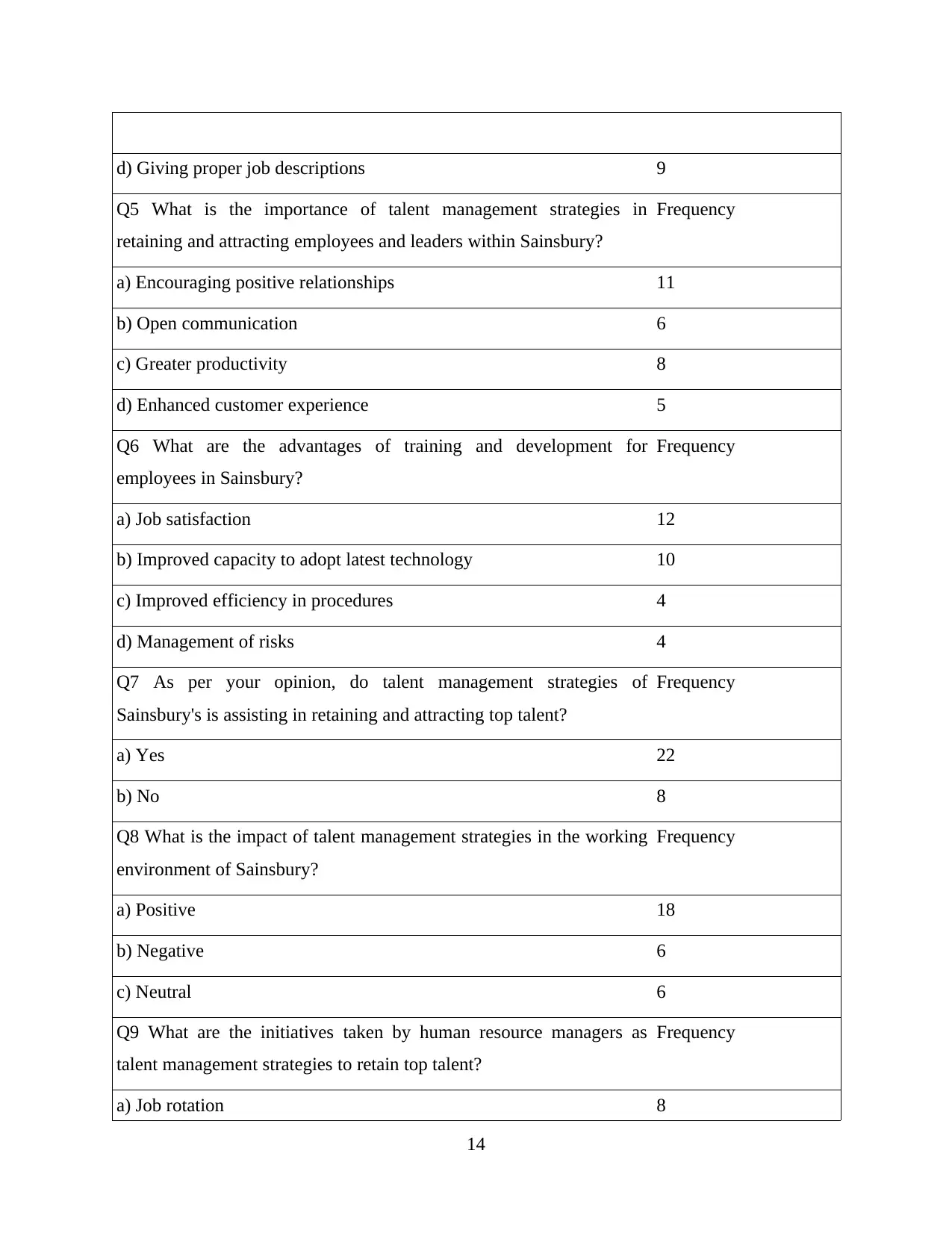
d) Giving proper job descriptions 9
Q5 What is the importance of talent management strategies in
retaining and attracting employees and leaders within Sainsbury?
Frequency
a) Encouraging positive relationships 11
b) Open communication 6
c) Greater productivity 8
d) Enhanced customer experience 5
Q6 What are the advantages of training and development for
employees in Sainsbury?
Frequency
a) Job satisfaction 12
b) Improved capacity to adopt latest technology 10
c) Improved efficiency in procedures 4
d) Management of risks 4
Q7 As per your opinion, do talent management strategies of
Sainsbury's is assisting in retaining and attracting top talent?
Frequency
a) Yes 22
b) No 8
Q8 What is the impact of talent management strategies in the working
environment of Sainsbury?
Frequency
a) Positive 18
b) Negative 6
c) Neutral 6
Q9 What are the initiatives taken by human resource managers as
talent management strategies to retain top talent?
Frequency
a) Job rotation 8
14
Q5 What is the importance of talent management strategies in
retaining and attracting employees and leaders within Sainsbury?
Frequency
a) Encouraging positive relationships 11
b) Open communication 6
c) Greater productivity 8
d) Enhanced customer experience 5
Q6 What are the advantages of training and development for
employees in Sainsbury?
Frequency
a) Job satisfaction 12
b) Improved capacity to adopt latest technology 10
c) Improved efficiency in procedures 4
d) Management of risks 4
Q7 As per your opinion, do talent management strategies of
Sainsbury's is assisting in retaining and attracting top talent?
Frequency
a) Yes 22
b) No 8
Q8 What is the impact of talent management strategies in the working
environment of Sainsbury?
Frequency
a) Positive 18
b) Negative 6
c) Neutral 6
Q9 What are the initiatives taken by human resource managers as
talent management strategies to retain top talent?
Frequency
a) Job rotation 8
14
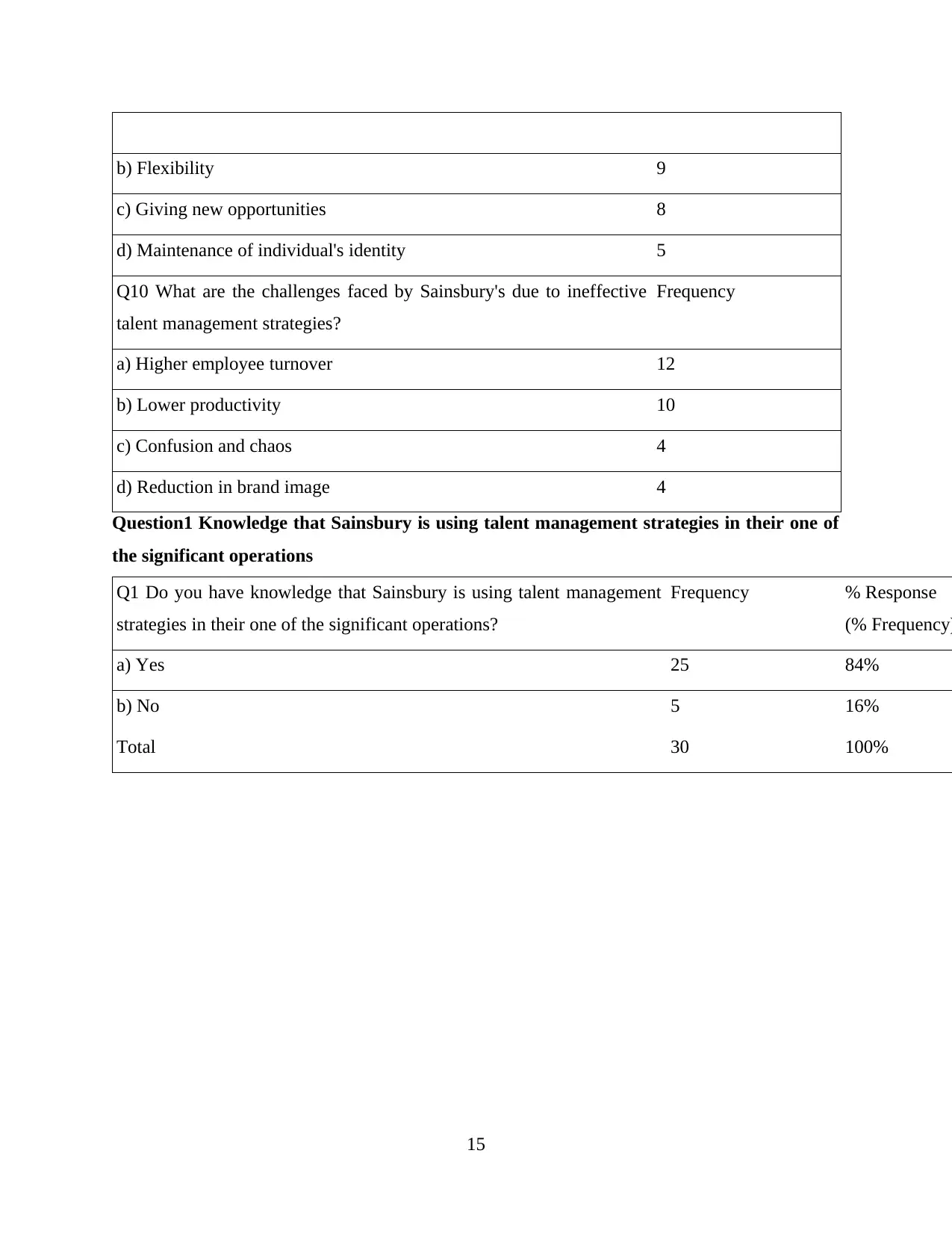
b) Flexibility 9
c) Giving new opportunities 8
d) Maintenance of individual's identity 5
Q10 What are the challenges faced by Sainsbury's due to ineffective
talent management strategies?
Frequency
a) Higher employee turnover 12
b) Lower productivity 10
c) Confusion and chaos 4
d) Reduction in brand image 4
Question1 Knowledge that Sainsbury is using talent management strategies in their one of
the significant operations
Q1 Do you have knowledge that Sainsbury is using talent management
strategies in their one of the significant operations?
Frequency % Response
(% Frequency)
a) Yes 25 84%
b) No 5 16%
Total 30 100%
15
c) Giving new opportunities 8
d) Maintenance of individual's identity 5
Q10 What are the challenges faced by Sainsbury's due to ineffective
talent management strategies?
Frequency
a) Higher employee turnover 12
b) Lower productivity 10
c) Confusion and chaos 4
d) Reduction in brand image 4
Question1 Knowledge that Sainsbury is using talent management strategies in their one of
the significant operations
Q1 Do you have knowledge that Sainsbury is using talent management
strategies in their one of the significant operations?
Frequency % Response
(% Frequency)
a) Yes 25 84%
b) No 5 16%
Total 30 100%
15
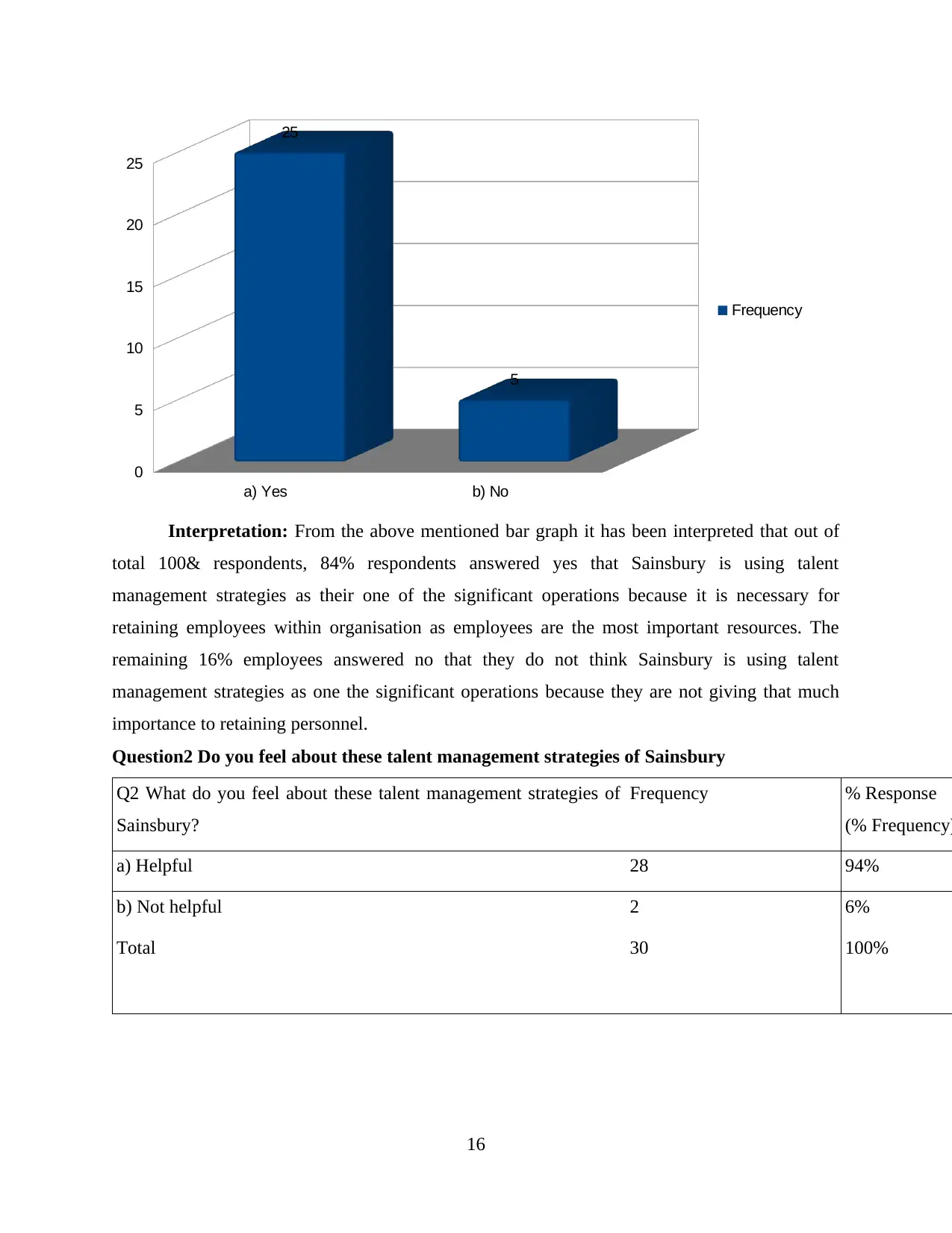
a) Yes b) No
0
5
10
15
20
25
25
5
Frequency
Interpretation: From the above mentioned bar graph it has been interpreted that out of
total 100& respondents, 84% respondents answered yes that Sainsbury is using talent
management strategies as their one of the significant operations because it is necessary for
retaining employees within organisation as employees are the most important resources. The
remaining 16% employees answered no that they do not think Sainsbury is using talent
management strategies as one the significant operations because they are not giving that much
importance to retaining personnel.
Question2 Do you feel about these talent management strategies of Sainsbury
Q2 What do you feel about these talent management strategies of
Sainsbury?
Frequency % Response
(% Frequency)
a) Helpful 28 94%
b) Not helpful 2 6%
Total 30 100%
16
0
5
10
15
20
25
25
5
Frequency
Interpretation: From the above mentioned bar graph it has been interpreted that out of
total 100& respondents, 84% respondents answered yes that Sainsbury is using talent
management strategies as their one of the significant operations because it is necessary for
retaining employees within organisation as employees are the most important resources. The
remaining 16% employees answered no that they do not think Sainsbury is using talent
management strategies as one the significant operations because they are not giving that much
importance to retaining personnel.
Question2 Do you feel about these talent management strategies of Sainsbury
Q2 What do you feel about these talent management strategies of
Sainsbury?
Frequency % Response
(% Frequency)
a) Helpful 28 94%
b) Not helpful 2 6%
Total 30 100%
16
Secure Best Marks with AI Grader
Need help grading? Try our AI Grader for instant feedback on your assignments.
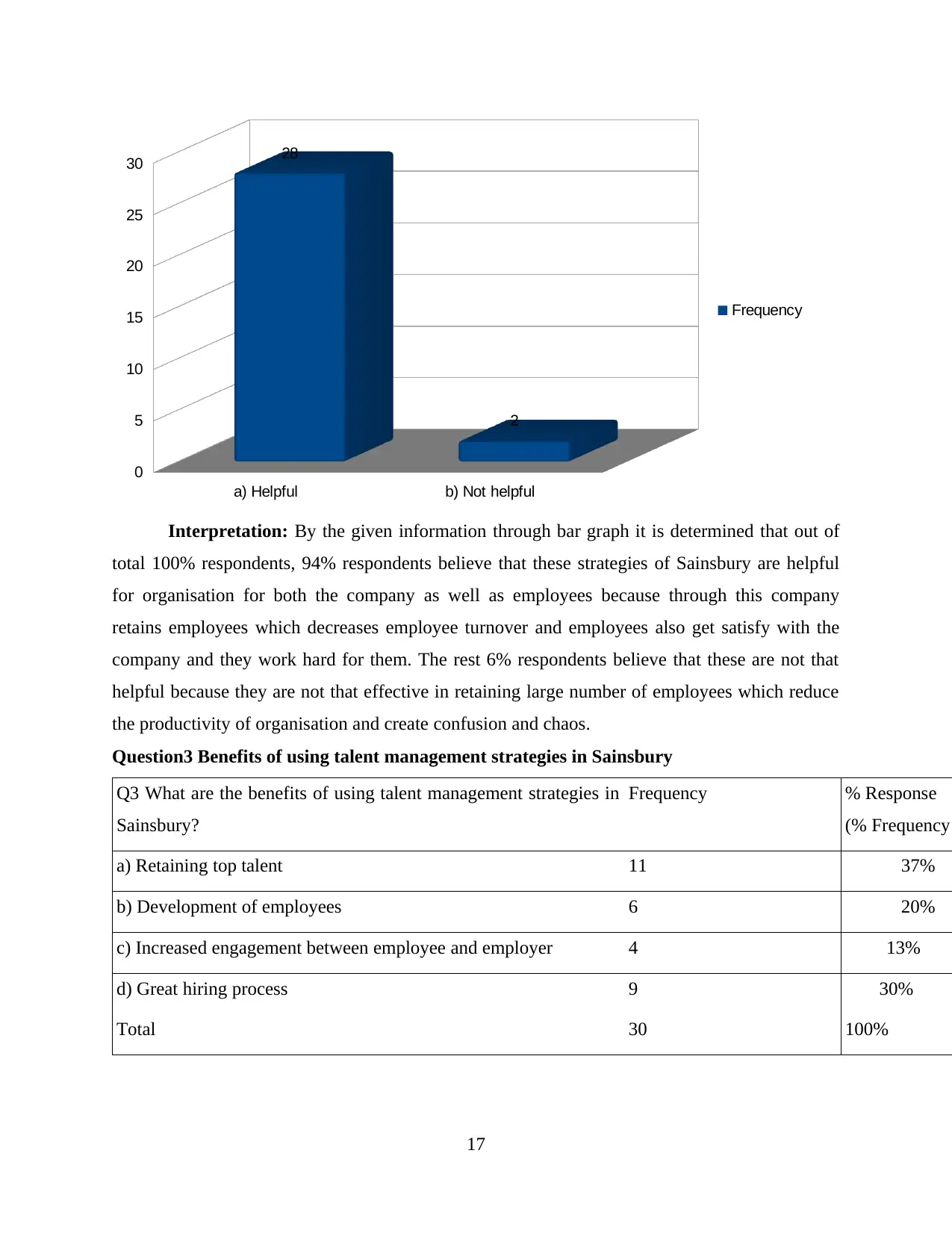
a) Helpful b) Not helpful
0
5
10
15
20
25
30 28
2
Frequency
Interpretation: By the given information through bar graph it is determined that out of
total 100% respondents, 94% respondents believe that these strategies of Sainsbury are helpful
for organisation for both the company as well as employees because through this company
retains employees which decreases employee turnover and employees also get satisfy with the
company and they work hard for them. The rest 6% respondents believe that these are not that
helpful because they are not that effective in retaining large number of employees which reduce
the productivity of organisation and create confusion and chaos.
Question3 Benefits of using talent management strategies in Sainsbury
Q3 What are the benefits of using talent management strategies in
Sainsbury?
Frequency % Response
(% Frequency
a) Retaining top talent 11 37%
b) Development of employees 6 20%
c) Increased engagement between employee and employer 4 13%
d) Great hiring process 9 30%
Total 30 100%
17
0
5
10
15
20
25
30 28
2
Frequency
Interpretation: By the given information through bar graph it is determined that out of
total 100% respondents, 94% respondents believe that these strategies of Sainsbury are helpful
for organisation for both the company as well as employees because through this company
retains employees which decreases employee turnover and employees also get satisfy with the
company and they work hard for them. The rest 6% respondents believe that these are not that
helpful because they are not that effective in retaining large number of employees which reduce
the productivity of organisation and create confusion and chaos.
Question3 Benefits of using talent management strategies in Sainsbury
Q3 What are the benefits of using talent management strategies in
Sainsbury?
Frequency % Response
(% Frequency
a) Retaining top talent 11 37%
b) Development of employees 6 20%
c) Increased engagement between employee and employer 4 13%
d) Great hiring process 9 30%
Total 30 100%
17
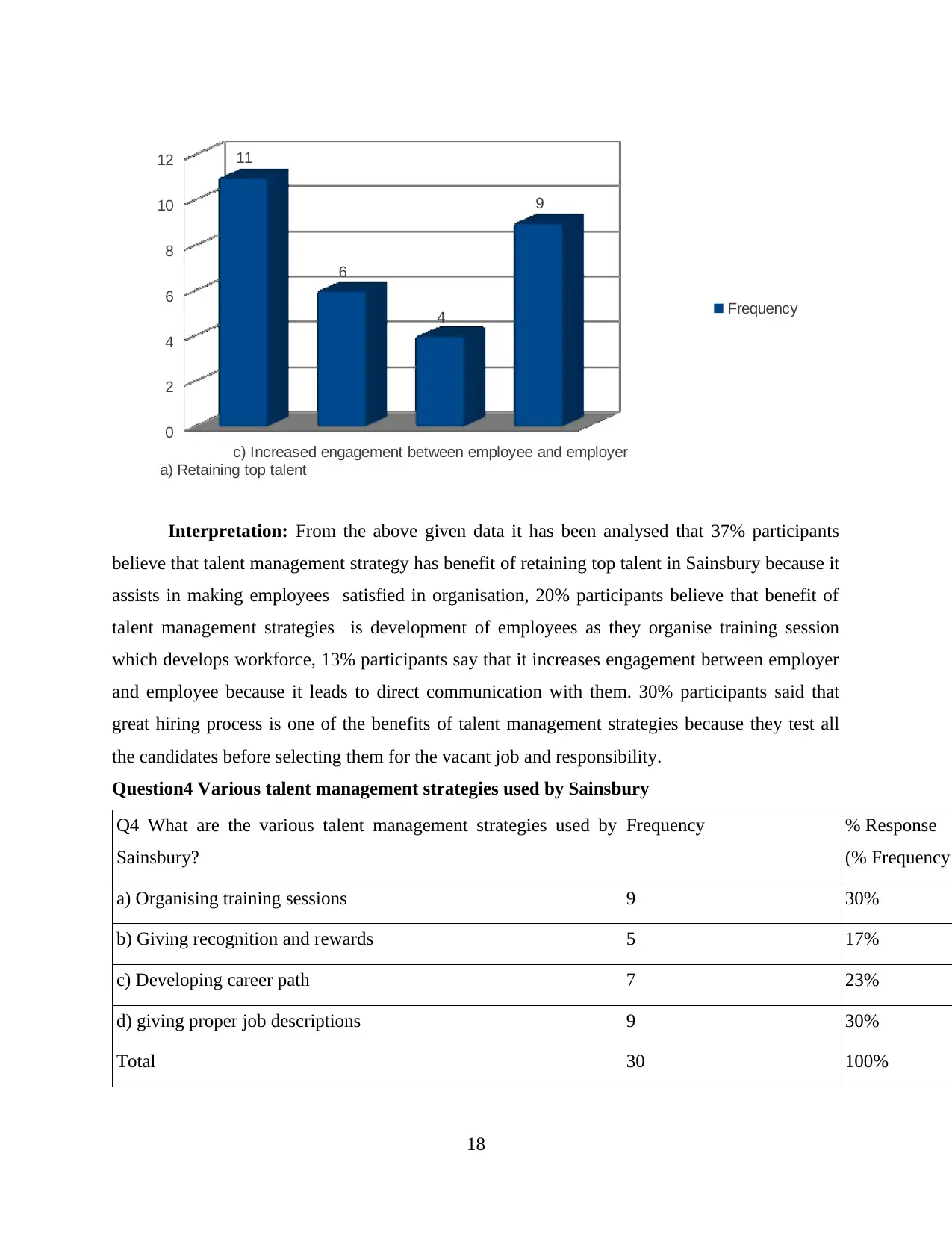
a) Retaining top talent
c) Increased engagement between employee and employer
0
2
4
6
8
10
12 11
6
4
9
Frequency
Interpretation: From the above given data it has been analysed that 37% participants
believe that talent management strategy has benefit of retaining top talent in Sainsbury because it
assists in making employees satisfied in organisation, 20% participants believe that benefit of
talent management strategies is development of employees as they organise training session
which develops workforce, 13% participants say that it increases engagement between employer
and employee because it leads to direct communication with them. 30% participants said that
great hiring process is one of the benefits of talent management strategies because they test all
the candidates before selecting them for the vacant job and responsibility.
Question4 Various talent management strategies used by Sainsbury
Q4 What are the various talent management strategies used by
Sainsbury?
Frequency % Response
(% Frequency
a) Organising training sessions 9 30%
b) Giving recognition and rewards 5 17%
c) Developing career path 7 23%
d) giving proper job descriptions 9 30%
Total 30 100%
18
c) Increased engagement between employee and employer
0
2
4
6
8
10
12 11
6
4
9
Frequency
Interpretation: From the above given data it has been analysed that 37% participants
believe that talent management strategy has benefit of retaining top talent in Sainsbury because it
assists in making employees satisfied in organisation, 20% participants believe that benefit of
talent management strategies is development of employees as they organise training session
which develops workforce, 13% participants say that it increases engagement between employer
and employee because it leads to direct communication with them. 30% participants said that
great hiring process is one of the benefits of talent management strategies because they test all
the candidates before selecting them for the vacant job and responsibility.
Question4 Various talent management strategies used by Sainsbury
Q4 What are the various talent management strategies used by
Sainsbury?
Frequency % Response
(% Frequency
a) Organising training sessions 9 30%
b) Giving recognition and rewards 5 17%
c) Developing career path 7 23%
d) giving proper job descriptions 9 30%
Total 30 100%
18
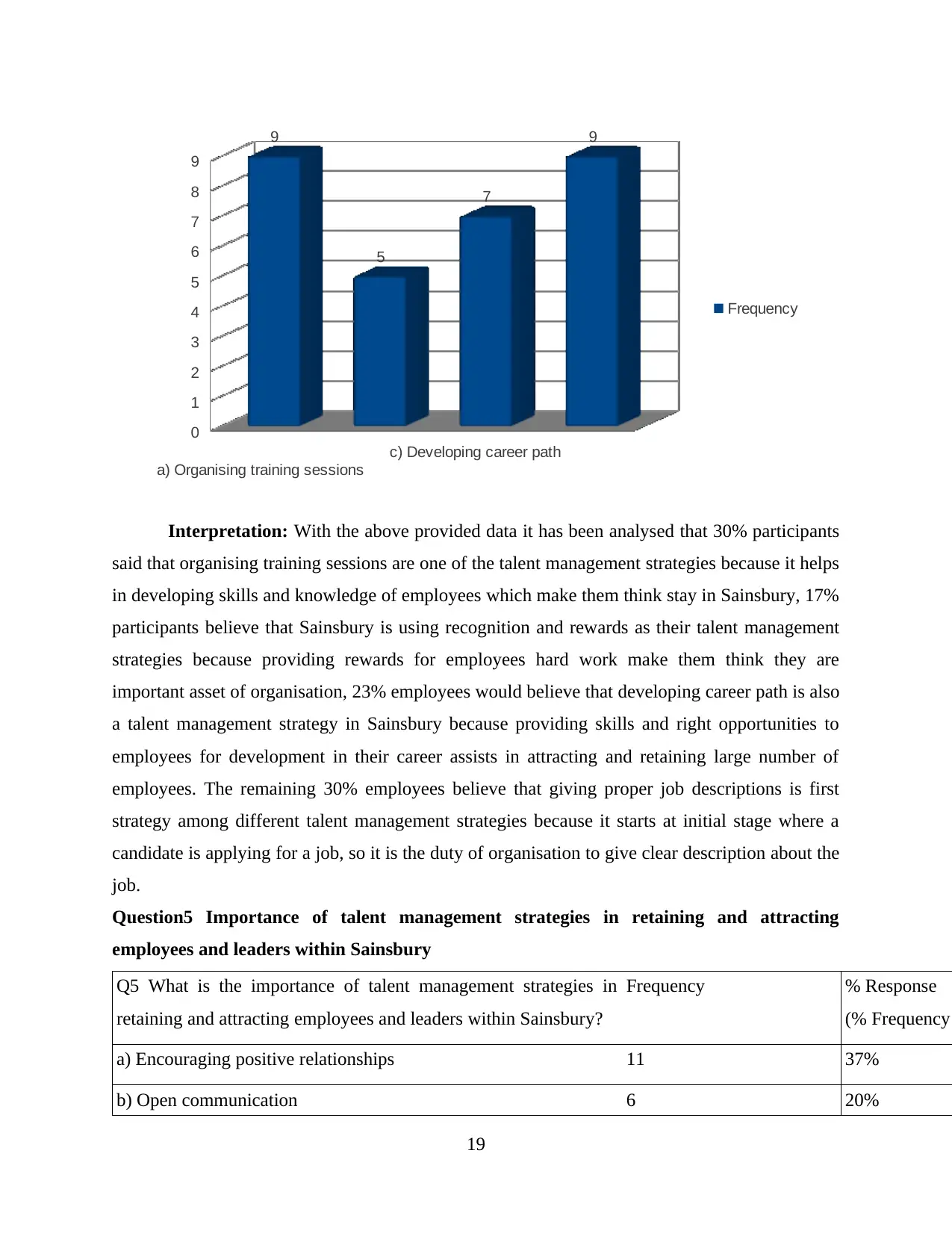
a) Organising training sessions
c) Developing career path
0
1
2
3
4
5
6
7
8
9
9
5
7
9
Frequency
Interpretation: With the above provided data it has been analysed that 30% participants
said that organising training sessions are one of the talent management strategies because it helps
in developing skills and knowledge of employees which make them think stay in Sainsbury, 17%
participants believe that Sainsbury is using recognition and rewards as their talent management
strategies because providing rewards for employees hard work make them think they are
important asset of organisation, 23% employees would believe that developing career path is also
a talent management strategy in Sainsbury because providing skills and right opportunities to
employees for development in their career assists in attracting and retaining large number of
employees. The remaining 30% employees believe that giving proper job descriptions is first
strategy among different talent management strategies because it starts at initial stage where a
candidate is applying for a job, so it is the duty of organisation to give clear description about the
job.
Question5 Importance of talent management strategies in retaining and attracting
employees and leaders within Sainsbury
Q5 What is the importance of talent management strategies in
retaining and attracting employees and leaders within Sainsbury?
Frequency % Response
(% Frequency
a) Encouraging positive relationships 11 37%
b) Open communication 6 20%
19
c) Developing career path
0
1
2
3
4
5
6
7
8
9
9
5
7
9
Frequency
Interpretation: With the above provided data it has been analysed that 30% participants
said that organising training sessions are one of the talent management strategies because it helps
in developing skills and knowledge of employees which make them think stay in Sainsbury, 17%
participants believe that Sainsbury is using recognition and rewards as their talent management
strategies because providing rewards for employees hard work make them think they are
important asset of organisation, 23% employees would believe that developing career path is also
a talent management strategy in Sainsbury because providing skills and right opportunities to
employees for development in their career assists in attracting and retaining large number of
employees. The remaining 30% employees believe that giving proper job descriptions is first
strategy among different talent management strategies because it starts at initial stage where a
candidate is applying for a job, so it is the duty of organisation to give clear description about the
job.
Question5 Importance of talent management strategies in retaining and attracting
employees and leaders within Sainsbury
Q5 What is the importance of talent management strategies in
retaining and attracting employees and leaders within Sainsbury?
Frequency % Response
(% Frequency
a) Encouraging positive relationships 11 37%
b) Open communication 6 20%
19
Paraphrase This Document
Need a fresh take? Get an instant paraphrase of this document with our AI Paraphraser
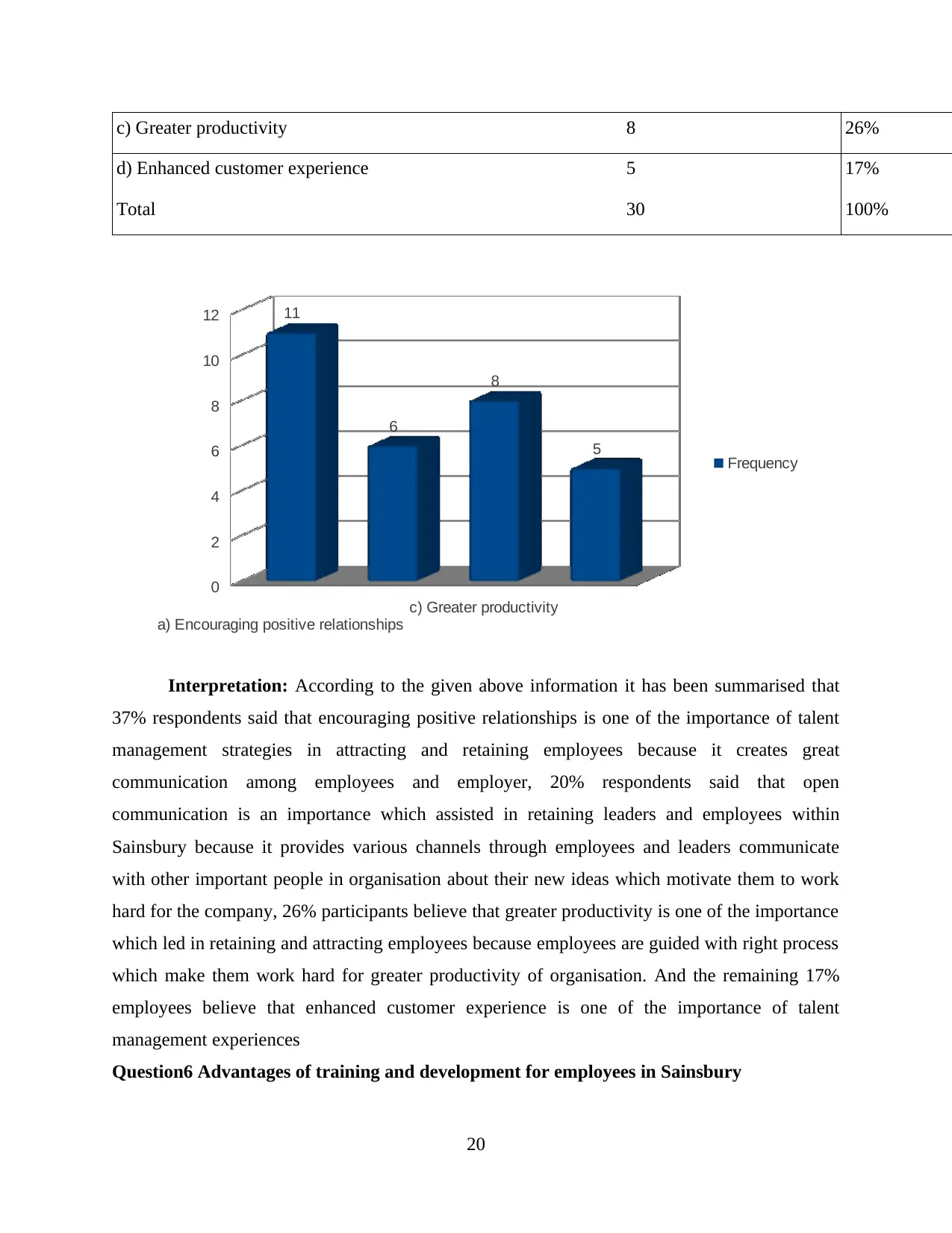
c) Greater productivity 8 26%
d) Enhanced customer experience 5 17%
Total 30 100%
a) Encouraging positive relationships
c) Greater productivity
0
2
4
6
8
10
12 11
6
8
5 Frequency
Interpretation: According to the given above information it has been summarised that
37% respondents said that encouraging positive relationships is one of the importance of talent
management strategies in attracting and retaining employees because it creates great
communication among employees and employer, 20% respondents said that open
communication is an importance which assisted in retaining leaders and employees within
Sainsbury because it provides various channels through employees and leaders communicate
with other important people in organisation about their new ideas which motivate them to work
hard for the company, 26% participants believe that greater productivity is one of the importance
which led in retaining and attracting employees because employees are guided with right process
which make them work hard for greater productivity of organisation. And the remaining 17%
employees believe that enhanced customer experience is one of the importance of talent
management experiences
Question6 Advantages of training and development for employees in Sainsbury
20
d) Enhanced customer experience 5 17%
Total 30 100%
a) Encouraging positive relationships
c) Greater productivity
0
2
4
6
8
10
12 11
6
8
5 Frequency
Interpretation: According to the given above information it has been summarised that
37% respondents said that encouraging positive relationships is one of the importance of talent
management strategies in attracting and retaining employees because it creates great
communication among employees and employer, 20% respondents said that open
communication is an importance which assisted in retaining leaders and employees within
Sainsbury because it provides various channels through employees and leaders communicate
with other important people in organisation about their new ideas which motivate them to work
hard for the company, 26% participants believe that greater productivity is one of the importance
which led in retaining and attracting employees because employees are guided with right process
which make them work hard for greater productivity of organisation. And the remaining 17%
employees believe that enhanced customer experience is one of the importance of talent
management experiences
Question6 Advantages of training and development for employees in Sainsbury
20
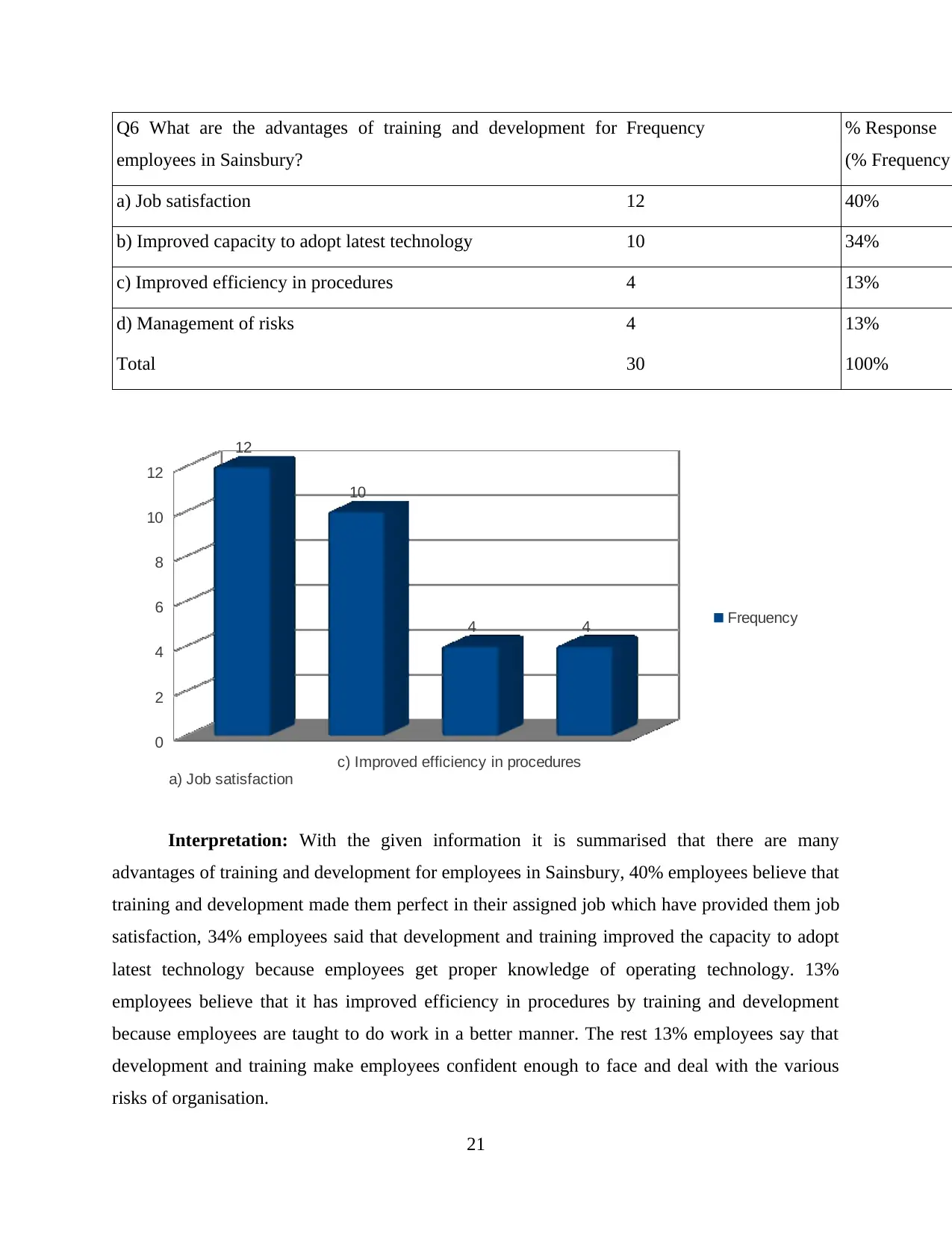
Q6 What are the advantages of training and development for
employees in Sainsbury?
Frequency % Response
(% Frequency
a) Job satisfaction 12 40%
b) Improved capacity to adopt latest technology 10 34%
c) Improved efficiency in procedures 4 13%
d) Management of risks 4 13%
Total 30 100%
a) Job satisfaction
c) Improved efficiency in procedures
0
2
4
6
8
10
12
12
10
4 4 Frequency
Interpretation: With the given information it is summarised that there are many
advantages of training and development for employees in Sainsbury, 40% employees believe that
training and development made them perfect in their assigned job which have provided them job
satisfaction, 34% employees said that development and training improved the capacity to adopt
latest technology because employees get proper knowledge of operating technology. 13%
employees believe that it has improved efficiency in procedures by training and development
because employees are taught to do work in a better manner. The rest 13% employees say that
development and training make employees confident enough to face and deal with the various
risks of organisation.
21
employees in Sainsbury?
Frequency % Response
(% Frequency
a) Job satisfaction 12 40%
b) Improved capacity to adopt latest technology 10 34%
c) Improved efficiency in procedures 4 13%
d) Management of risks 4 13%
Total 30 100%
a) Job satisfaction
c) Improved efficiency in procedures
0
2
4
6
8
10
12
12
10
4 4 Frequency
Interpretation: With the given information it is summarised that there are many
advantages of training and development for employees in Sainsbury, 40% employees believe that
training and development made them perfect in their assigned job which have provided them job
satisfaction, 34% employees said that development and training improved the capacity to adopt
latest technology because employees get proper knowledge of operating technology. 13%
employees believe that it has improved efficiency in procedures by training and development
because employees are taught to do work in a better manner. The rest 13% employees say that
development and training make employees confident enough to face and deal with the various
risks of organisation.
21
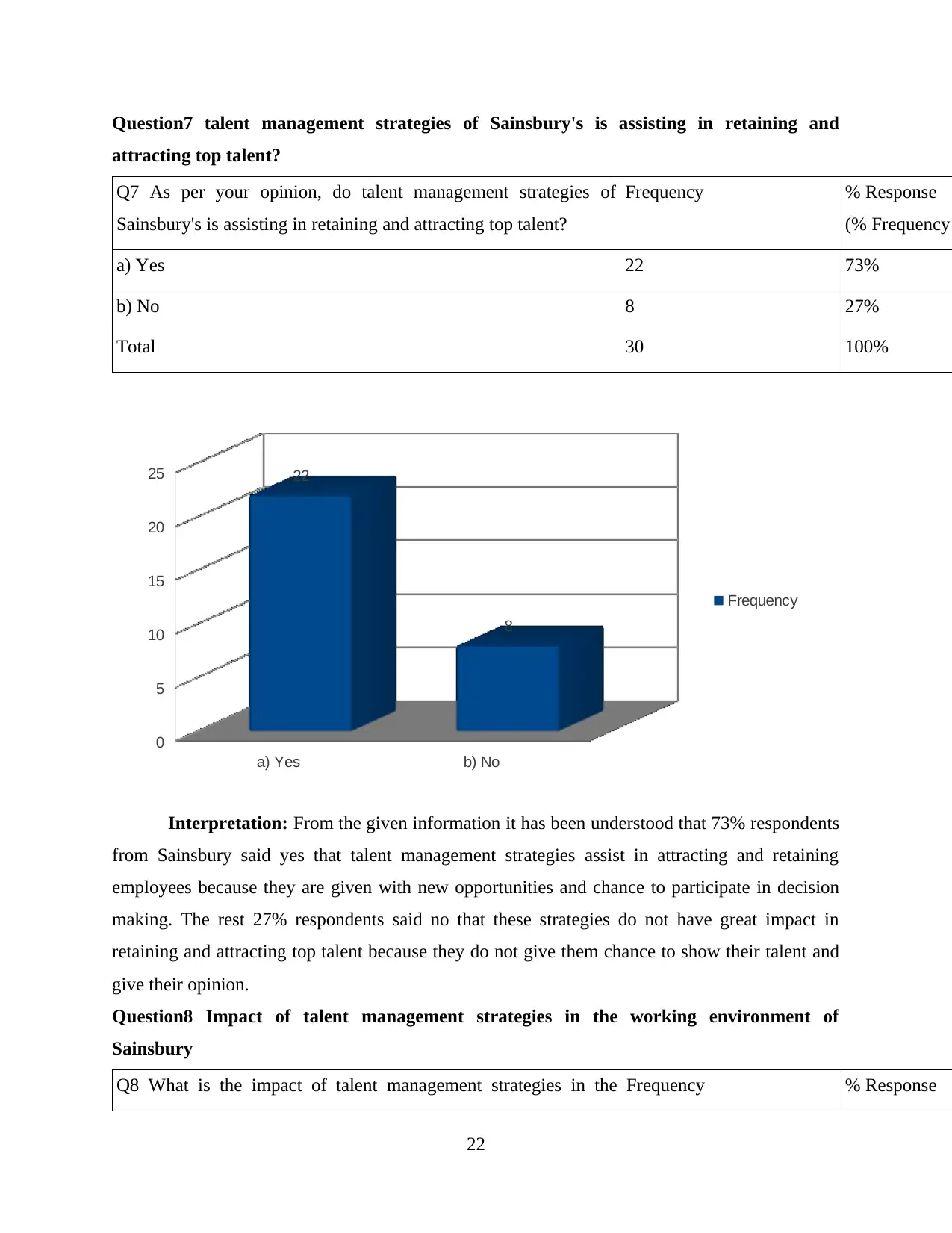
Question7 talent management strategies of Sainsbury's is assisting in retaining and
attracting top talent?
Q7 As per your opinion, do talent management strategies of
Sainsbury's is assisting in retaining and attracting top talent?
Frequency % Response
(% Frequency
a) Yes 22 73%
b) No 8 27%
Total 30 100%
a) Yes b) No
0
5
10
15
20
25 22
8
Frequency
Interpretation: From the given information it has been understood that 73% respondents
from Sainsbury said yes that talent management strategies assist in attracting and retaining
employees because they are given with new opportunities and chance to participate in decision
making. The rest 27% respondents said no that these strategies do not have great impact in
retaining and attracting top talent because they do not give them chance to show their talent and
give their opinion.
Question8 Impact of talent management strategies in the working environment of
Sainsbury
Q8 What is the impact of talent management strategies in the Frequency % Response
22
attracting top talent?
Q7 As per your opinion, do talent management strategies of
Sainsbury's is assisting in retaining and attracting top talent?
Frequency % Response
(% Frequency
a) Yes 22 73%
b) No 8 27%
Total 30 100%
a) Yes b) No
0
5
10
15
20
25 22
8
Frequency
Interpretation: From the given information it has been understood that 73% respondents
from Sainsbury said yes that talent management strategies assist in attracting and retaining
employees because they are given with new opportunities and chance to participate in decision
making. The rest 27% respondents said no that these strategies do not have great impact in
retaining and attracting top talent because they do not give them chance to show their talent and
give their opinion.
Question8 Impact of talent management strategies in the working environment of
Sainsbury
Q8 What is the impact of talent management strategies in the Frequency % Response
22
Secure Best Marks with AI Grader
Need help grading? Try our AI Grader for instant feedback on your assignments.
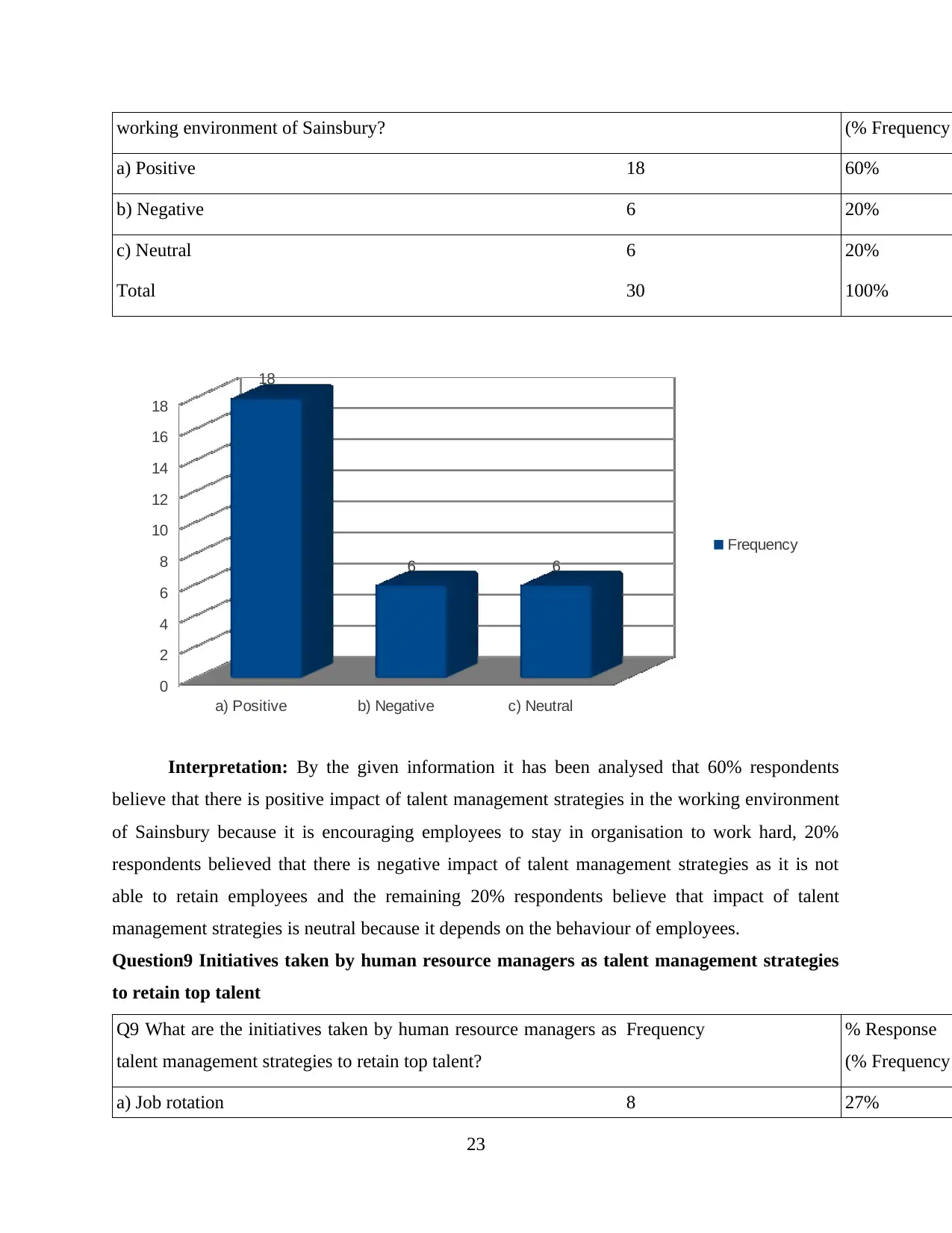
working environment of Sainsbury? (% Frequency
a) Positive 18 60%
b) Negative 6 20%
c) Neutral 6 20%
Total 30 100%
a) Positive b) Negative c) Neutral
0
2
4
6
8
10
12
14
16
18
18
6 6
Frequency
Interpretation: By the given information it has been analysed that 60% respondents
believe that there is positive impact of talent management strategies in the working environment
of Sainsbury because it is encouraging employees to stay in organisation to work hard, 20%
respondents believed that there is negative impact of talent management strategies as it is not
able to retain employees and the remaining 20% respondents believe that impact of talent
management strategies is neutral because it depends on the behaviour of employees.
Question9 Initiatives taken by human resource managers as talent management strategies
to retain top talent
Q9 What are the initiatives taken by human resource managers as
talent management strategies to retain top talent?
Frequency % Response
(% Frequency
a) Job rotation 8 27%
23
a) Positive 18 60%
b) Negative 6 20%
c) Neutral 6 20%
Total 30 100%
a) Positive b) Negative c) Neutral
0
2
4
6
8
10
12
14
16
18
18
6 6
Frequency
Interpretation: By the given information it has been analysed that 60% respondents
believe that there is positive impact of talent management strategies in the working environment
of Sainsbury because it is encouraging employees to stay in organisation to work hard, 20%
respondents believed that there is negative impact of talent management strategies as it is not
able to retain employees and the remaining 20% respondents believe that impact of talent
management strategies is neutral because it depends on the behaviour of employees.
Question9 Initiatives taken by human resource managers as talent management strategies
to retain top talent
Q9 What are the initiatives taken by human resource managers as
talent management strategies to retain top talent?
Frequency % Response
(% Frequency
a) Job rotation 8 27%
23
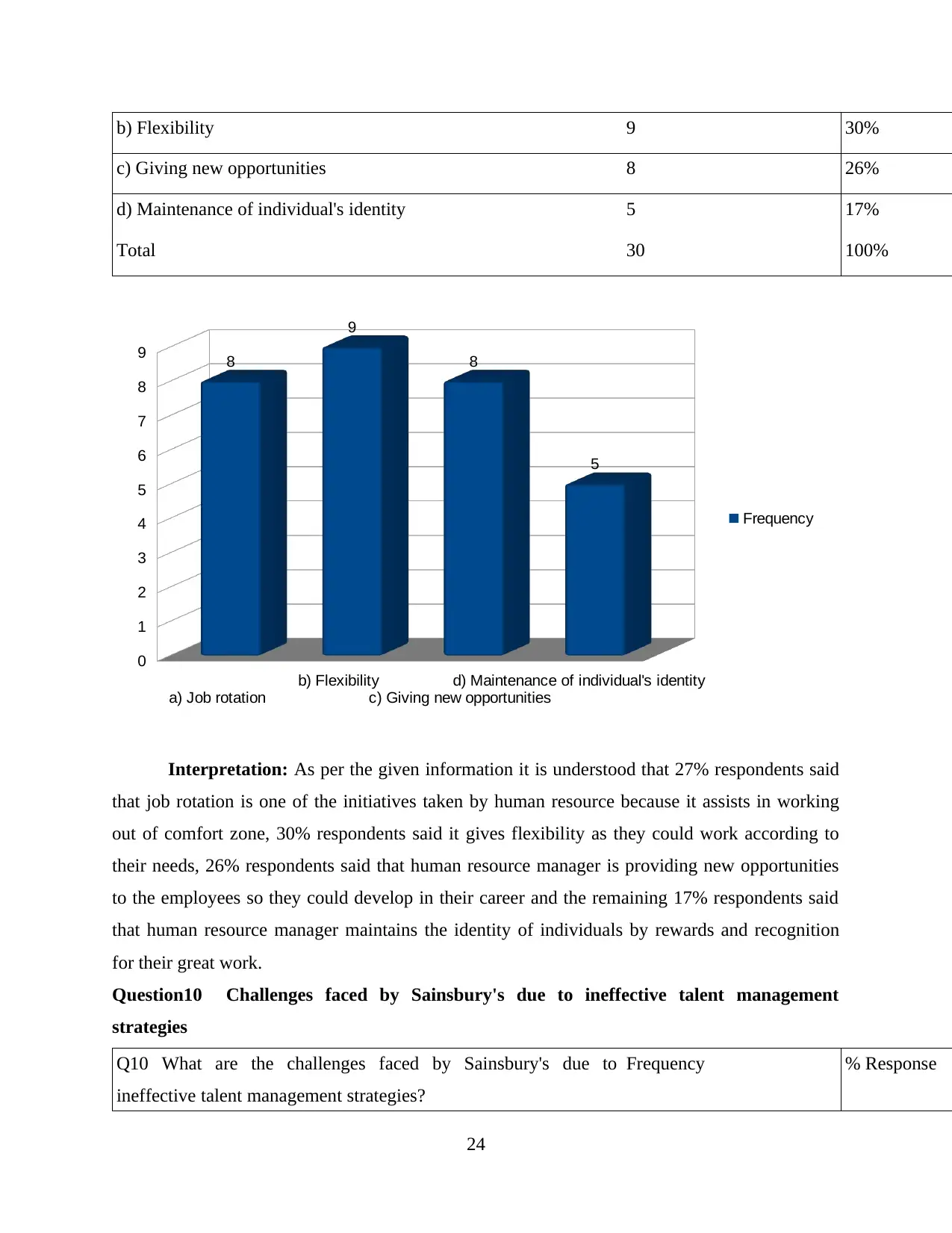
b) Flexibility 9 30%
c) Giving new opportunities 8 26%
d) Maintenance of individual's identity 5 17%
Total 30 100%
Interpretation: As per the given information it is understood that 27% respondents said
that job rotation is one of the initiatives taken by human resource because it assists in working
out of comfort zone, 30% respondents said it gives flexibility as they could work according to
their needs, 26% respondents said that human resource manager is providing new opportunities
to the employees so they could develop in their career and the remaining 17% respondents said
that human resource manager maintains the identity of individuals by rewards and recognition
for their great work.
Question10 Challenges faced by Sainsbury's due to ineffective talent management
strategies
Q10 What are the challenges faced by Sainsbury's due to
ineffective talent management strategies?
Frequency % Response
24
a) Job rotation
b) Flexibility
c) Giving new opportunities
d) Maintenance of individual's identity
0
1
2
3
4
5
6
7
8
9 8
9
8
5
Frequency
c) Giving new opportunities 8 26%
d) Maintenance of individual's identity 5 17%
Total 30 100%
Interpretation: As per the given information it is understood that 27% respondents said
that job rotation is one of the initiatives taken by human resource because it assists in working
out of comfort zone, 30% respondents said it gives flexibility as they could work according to
their needs, 26% respondents said that human resource manager is providing new opportunities
to the employees so they could develop in their career and the remaining 17% respondents said
that human resource manager maintains the identity of individuals by rewards and recognition
for their great work.
Question10 Challenges faced by Sainsbury's due to ineffective talent management
strategies
Q10 What are the challenges faced by Sainsbury's due to
ineffective talent management strategies?
Frequency % Response
24
a) Job rotation
b) Flexibility
c) Giving new opportunities
d) Maintenance of individual's identity
0
1
2
3
4
5
6
7
8
9 8
9
8
5
Frequency
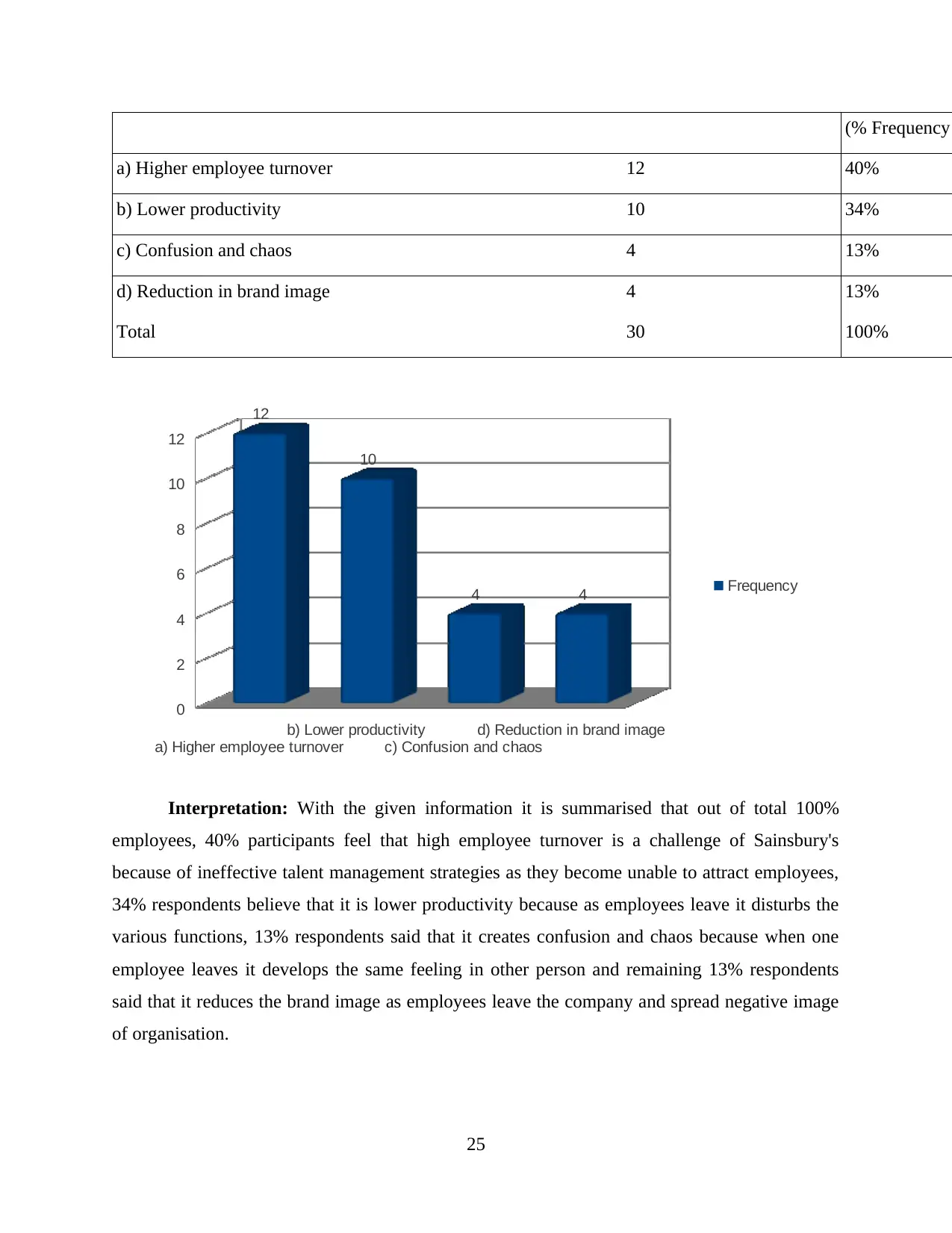
(% Frequency
a) Higher employee turnover 12 40%
b) Lower productivity 10 34%
c) Confusion and chaos 4 13%
d) Reduction in brand image 4 13%
Total 30 100%
a) Higher employee turnover
b) Lower productivity
c) Confusion and chaos
d) Reduction in brand image
0
2
4
6
8
10
12
12
10
4 4 Frequency
Interpretation: With the given information it is summarised that out of total 100%
employees, 40% participants feel that high employee turnover is a challenge of Sainsbury's
because of ineffective talent management strategies as they become unable to attract employees,
34% respondents believe that it is lower productivity because as employees leave it disturbs the
various functions, 13% respondents said that it creates confusion and chaos because when one
employee leaves it develops the same feeling in other person and remaining 13% respondents
said that it reduces the brand image as employees leave the company and spread negative image
of organisation.
25
a) Higher employee turnover 12 40%
b) Lower productivity 10 34%
c) Confusion and chaos 4 13%
d) Reduction in brand image 4 13%
Total 30 100%
a) Higher employee turnover
b) Lower productivity
c) Confusion and chaos
d) Reduction in brand image
0
2
4
6
8
10
12
12
10
4 4 Frequency
Interpretation: With the given information it is summarised that out of total 100%
employees, 40% participants feel that high employee turnover is a challenge of Sainsbury's
because of ineffective talent management strategies as they become unable to attract employees,
34% respondents believe that it is lower productivity because as employees leave it disturbs the
various functions, 13% respondents said that it creates confusion and chaos because when one
employee leaves it develops the same feeling in other person and remaining 13% respondents
said that it reduces the brand image as employees leave the company and spread negative image
of organisation.
25
Paraphrase This Document
Need a fresh take? Get an instant paraphrase of this document with our AI Paraphraser
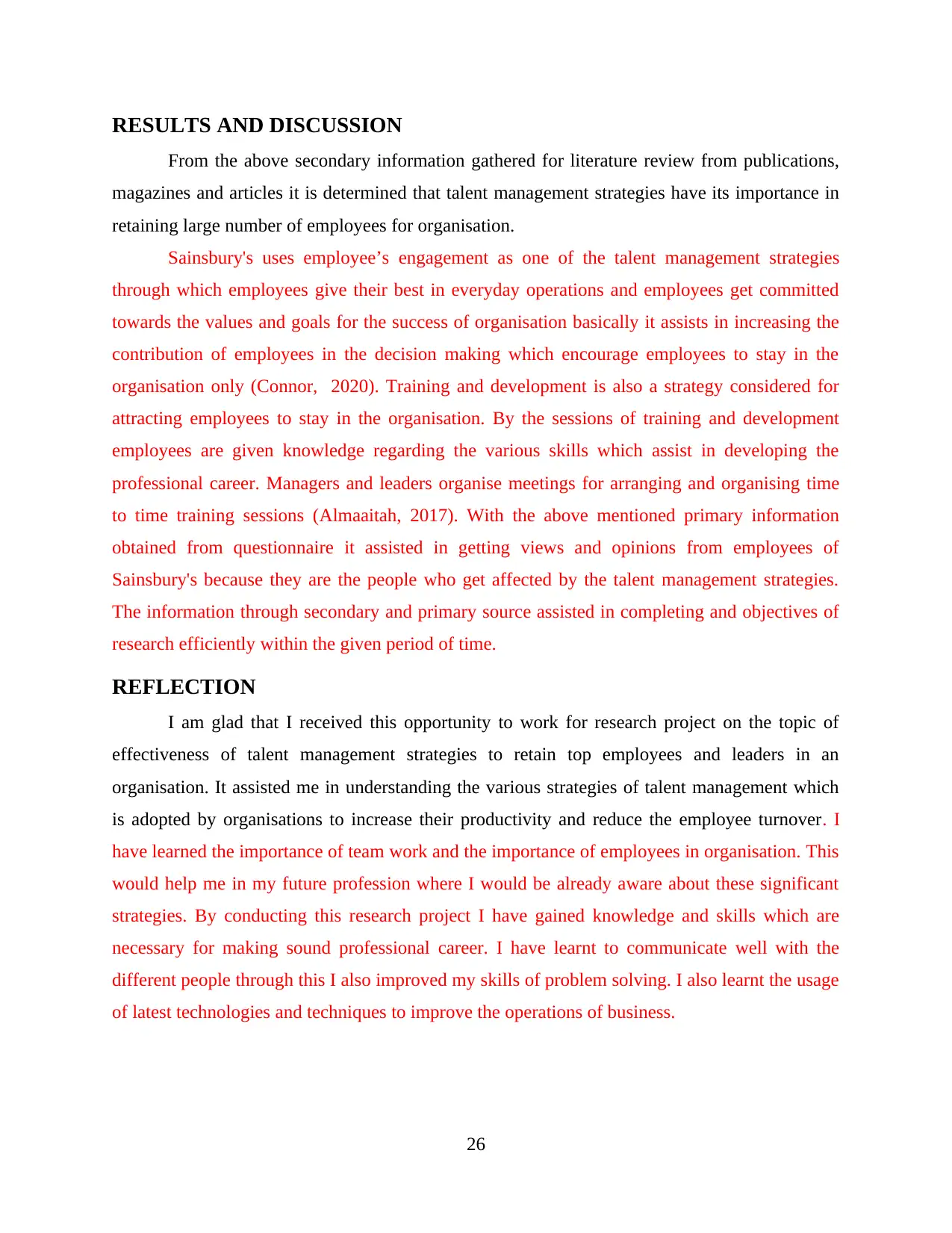
RESULTS AND DISCUSSION
From the above secondary information gathered for literature review from publications,
magazines and articles it is determined that talent management strategies have its importance in
retaining large number of employees for organisation.
Sainsbury's uses employee’s engagement as one of the talent management strategies
through which employees give their best in everyday operations and employees get committed
towards the values and goals for the success of organisation basically it assists in increasing the
contribution of employees in the decision making which encourage employees to stay in the
organisation only (Connor, 2020). Training and development is also a strategy considered for
attracting employees to stay in the organisation. By the sessions of training and development
employees are given knowledge regarding the various skills which assist in developing the
professional career. Managers and leaders organise meetings for arranging and organising time
to time training sessions (Almaaitah, 2017). With the above mentioned primary information
obtained from questionnaire it assisted in getting views and opinions from employees of
Sainsbury's because they are the people who get affected by the talent management strategies.
The information through secondary and primary source assisted in completing and objectives of
research efficiently within the given period of time.
REFLECTION
I am glad that I received this opportunity to work for research project on the topic of
effectiveness of talent management strategies to retain top employees and leaders in an
organisation. It assisted me in understanding the various strategies of talent management which
is adopted by organisations to increase their productivity and reduce the employee turnover. I
have learned the importance of team work and the importance of employees in organisation. This
would help me in my future profession where I would be already aware about these significant
strategies. By conducting this research project I have gained knowledge and skills which are
necessary for making sound professional career. I have learnt to communicate well with the
different people through this I also improved my skills of problem solving. I also learnt the usage
of latest technologies and techniques to improve the operations of business.
26
From the above secondary information gathered for literature review from publications,
magazines and articles it is determined that talent management strategies have its importance in
retaining large number of employees for organisation.
Sainsbury's uses employee’s engagement as one of the talent management strategies
through which employees give their best in everyday operations and employees get committed
towards the values and goals for the success of organisation basically it assists in increasing the
contribution of employees in the decision making which encourage employees to stay in the
organisation only (Connor, 2020). Training and development is also a strategy considered for
attracting employees to stay in the organisation. By the sessions of training and development
employees are given knowledge regarding the various skills which assist in developing the
professional career. Managers and leaders organise meetings for arranging and organising time
to time training sessions (Almaaitah, 2017). With the above mentioned primary information
obtained from questionnaire it assisted in getting views and opinions from employees of
Sainsbury's because they are the people who get affected by the talent management strategies.
The information through secondary and primary source assisted in completing and objectives of
research efficiently within the given period of time.
REFLECTION
I am glad that I received this opportunity to work for research project on the topic of
effectiveness of talent management strategies to retain top employees and leaders in an
organisation. It assisted me in understanding the various strategies of talent management which
is adopted by organisations to increase their productivity and reduce the employee turnover. I
have learned the importance of team work and the importance of employees in organisation. This
would help me in my future profession where I would be already aware about these significant
strategies. By conducting this research project I have gained knowledge and skills which are
necessary for making sound professional career. I have learnt to communicate well with the
different people through this I also improved my skills of problem solving. I also learnt the usage
of latest technologies and techniques to improve the operations of business.
26
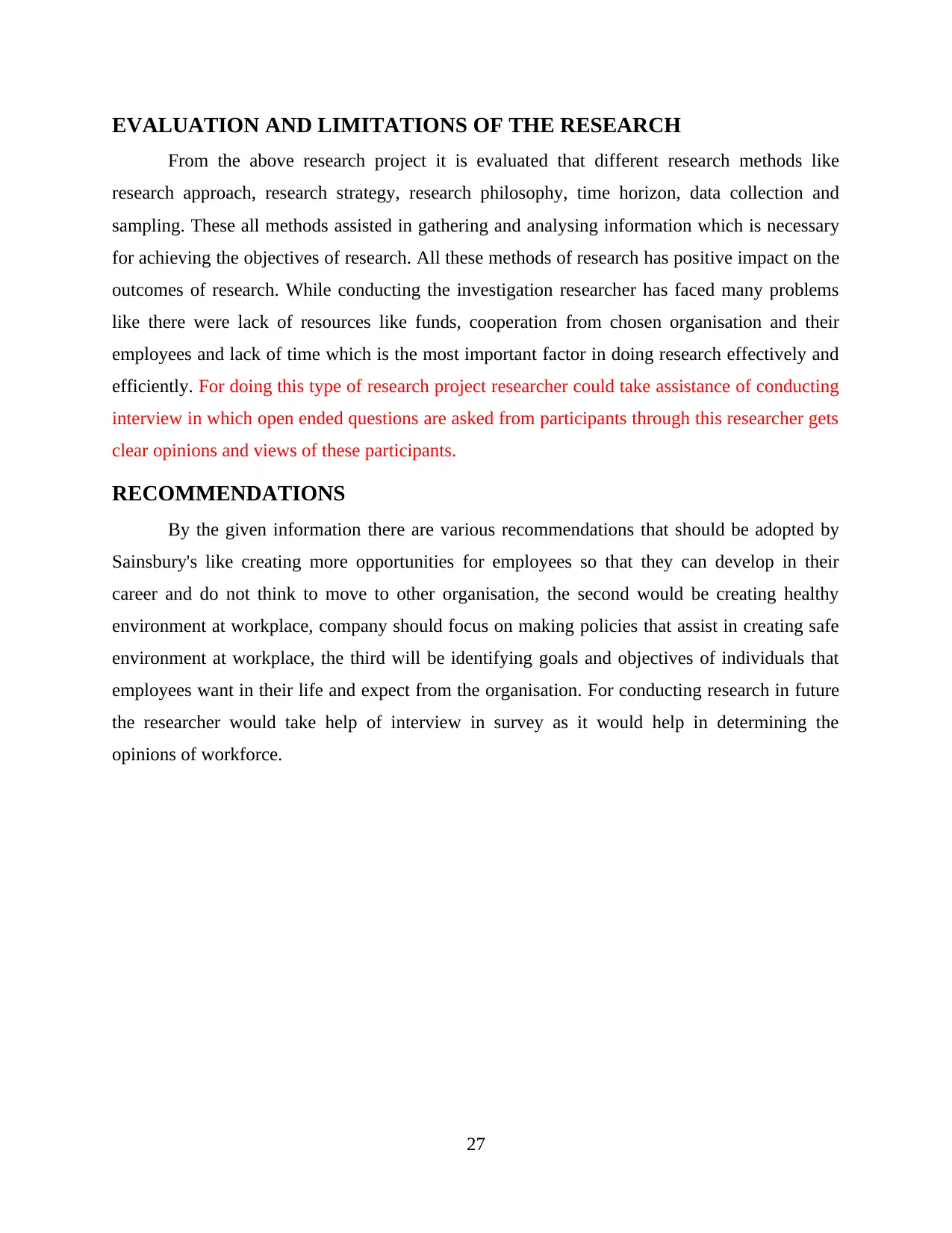
EVALUATION AND LIMITATIONS OF THE RESEARCH
From the above research project it is evaluated that different research methods like
research approach, research strategy, research philosophy, time horizon, data collection and
sampling. These all methods assisted in gathering and analysing information which is necessary
for achieving the objectives of research. All these methods of research has positive impact on the
outcomes of research. While conducting the investigation researcher has faced many problems
like there were lack of resources like funds, cooperation from chosen organisation and their
employees and lack of time which is the most important factor in doing research effectively and
efficiently. For doing this type of research project researcher could take assistance of conducting
interview in which open ended questions are asked from participants through this researcher gets
clear opinions and views of these participants.
RECOMMENDATIONS
By the given information there are various recommendations that should be adopted by
Sainsbury's like creating more opportunities for employees so that they can develop in their
career and do not think to move to other organisation, the second would be creating healthy
environment at workplace, company should focus on making policies that assist in creating safe
environment at workplace, the third will be identifying goals and objectives of individuals that
employees want in their life and expect from the organisation. For conducting research in future
the researcher would take help of interview in survey as it would help in determining the
opinions of workforce.
27
From the above research project it is evaluated that different research methods like
research approach, research strategy, research philosophy, time horizon, data collection and
sampling. These all methods assisted in gathering and analysing information which is necessary
for achieving the objectives of research. All these methods of research has positive impact on the
outcomes of research. While conducting the investigation researcher has faced many problems
like there were lack of resources like funds, cooperation from chosen organisation and their
employees and lack of time which is the most important factor in doing research effectively and
efficiently. For doing this type of research project researcher could take assistance of conducting
interview in which open ended questions are asked from participants through this researcher gets
clear opinions and views of these participants.
RECOMMENDATIONS
By the given information there are various recommendations that should be adopted by
Sainsbury's like creating more opportunities for employees so that they can develop in their
career and do not think to move to other organisation, the second would be creating healthy
environment at workplace, company should focus on making policies that assist in creating safe
environment at workplace, the third will be identifying goals and objectives of individuals that
employees want in their life and expect from the organisation. For conducting research in future
the researcher would take help of interview in survey as it would help in determining the
opinions of workforce.
27
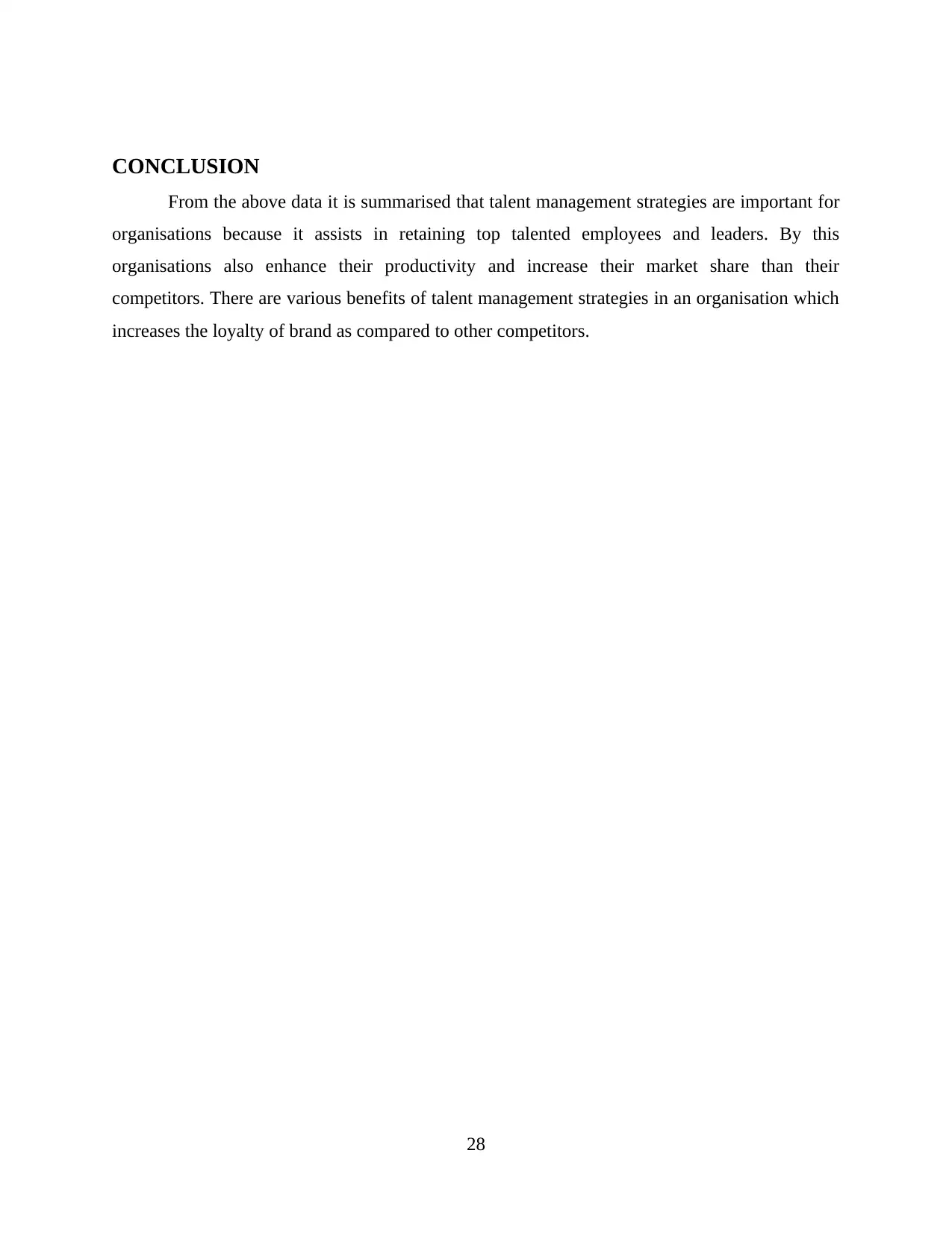
CONCLUSION
From the above data it is summarised that talent management strategies are important for
organisations because it assists in retaining top talented employees and leaders. By this
organisations also enhance their productivity and increase their market share than their
competitors. There are various benefits of talent management strategies in an organisation which
increases the loyalty of brand as compared to other competitors.
28
From the above data it is summarised that talent management strategies are important for
organisations because it assists in retaining top talented employees and leaders. By this
organisations also enhance their productivity and increase their market share than their
competitors. There are various benefits of talent management strategies in an organisation which
increases the loyalty of brand as compared to other competitors.
28
Secure Best Marks with AI Grader
Need help grading? Try our AI Grader for instant feedback on your assignments.
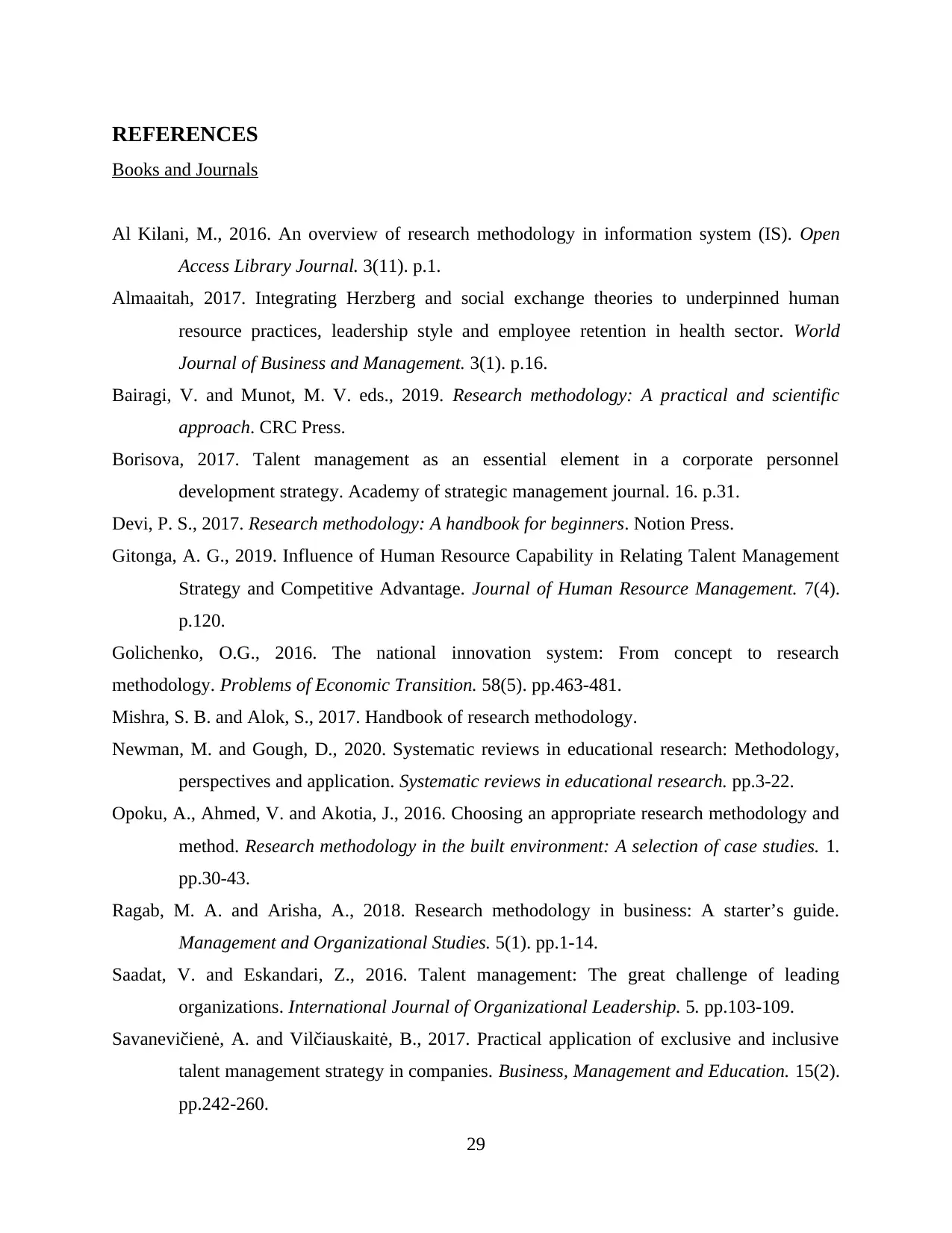
REFERENCES
Books and Journals
Al Kilani, M., 2016. An overview of research methodology in information system (IS). Open
Access Library Journal. 3(11). p.1.
Almaaitah, 2017. Integrating Herzberg and social exchange theories to underpinned human
resource practices, leadership style and employee retention in health sector. World
Journal of Business and Management. 3(1). p.16.
Bairagi, V. and Munot, M. V. eds., 2019. Research methodology: A practical and scientific
approach. CRC Press.
Borisova, 2017. Talent management as an essential element in a corporate personnel
development strategy. Academy of strategic management journal. 16. p.31.
Devi, P. S., 2017. Research methodology: A handbook for beginners. Notion Press.
Gitonga, A. G., 2019. Influence of Human Resource Capability in Relating Talent Management
Strategy and Competitive Advantage. Journal of Human Resource Management. 7(4).
p.120.
Golichenko, O.G., 2016. The national innovation system: From concept to research
methodology. Problems of Economic Transition. 58(5). pp.463-481.
Mishra, S. B. and Alok, S., 2017. Handbook of research methodology.
Newman, M. and Gough, D., 2020. Systematic reviews in educational research: Methodology,
perspectives and application. Systematic reviews in educational research. pp.3-22.
Opoku, A., Ahmed, V. and Akotia, J., 2016. Choosing an appropriate research methodology and
method. Research methodology in the built environment: A selection of case studies. 1.
pp.30-43.
Ragab, M. A. and Arisha, A., 2018. Research methodology in business: A starter’s guide.
Management and Organizational Studies. 5(1). pp.1-14.
Saadat, V. and Eskandari, Z., 2016. Talent management: The great challenge of leading
organizations. International Journal of Organizational Leadership. 5. pp.103-109.
Savanevičienė, A. and Vilčiauskaitė, B., 2017. Practical application of exclusive and inclusive
talent management strategy in companies. Business, Management and Education. 15(2).
pp.242-260.
29
Books and Journals
Al Kilani, M., 2016. An overview of research methodology in information system (IS). Open
Access Library Journal. 3(11). p.1.
Almaaitah, 2017. Integrating Herzberg and social exchange theories to underpinned human
resource practices, leadership style and employee retention in health sector. World
Journal of Business and Management. 3(1). p.16.
Bairagi, V. and Munot, M. V. eds., 2019. Research methodology: A practical and scientific
approach. CRC Press.
Borisova, 2017. Talent management as an essential element in a corporate personnel
development strategy. Academy of strategic management journal. 16. p.31.
Devi, P. S., 2017. Research methodology: A handbook for beginners. Notion Press.
Gitonga, A. G., 2019. Influence of Human Resource Capability in Relating Talent Management
Strategy and Competitive Advantage. Journal of Human Resource Management. 7(4).
p.120.
Golichenko, O.G., 2016. The national innovation system: From concept to research
methodology. Problems of Economic Transition. 58(5). pp.463-481.
Mishra, S. B. and Alok, S., 2017. Handbook of research methodology.
Newman, M. and Gough, D., 2020. Systematic reviews in educational research: Methodology,
perspectives and application. Systematic reviews in educational research. pp.3-22.
Opoku, A., Ahmed, V. and Akotia, J., 2016. Choosing an appropriate research methodology and
method. Research methodology in the built environment: A selection of case studies. 1.
pp.30-43.
Ragab, M. A. and Arisha, A., 2018. Research methodology in business: A starter’s guide.
Management and Organizational Studies. 5(1). pp.1-14.
Saadat, V. and Eskandari, Z., 2016. Talent management: The great challenge of leading
organizations. International Journal of Organizational Leadership. 5. pp.103-109.
Savanevičienė, A. and Vilčiauskaitė, B., 2017. Practical application of exclusive and inclusive
talent management strategy in companies. Business, Management and Education. 15(2).
pp.242-260.
29
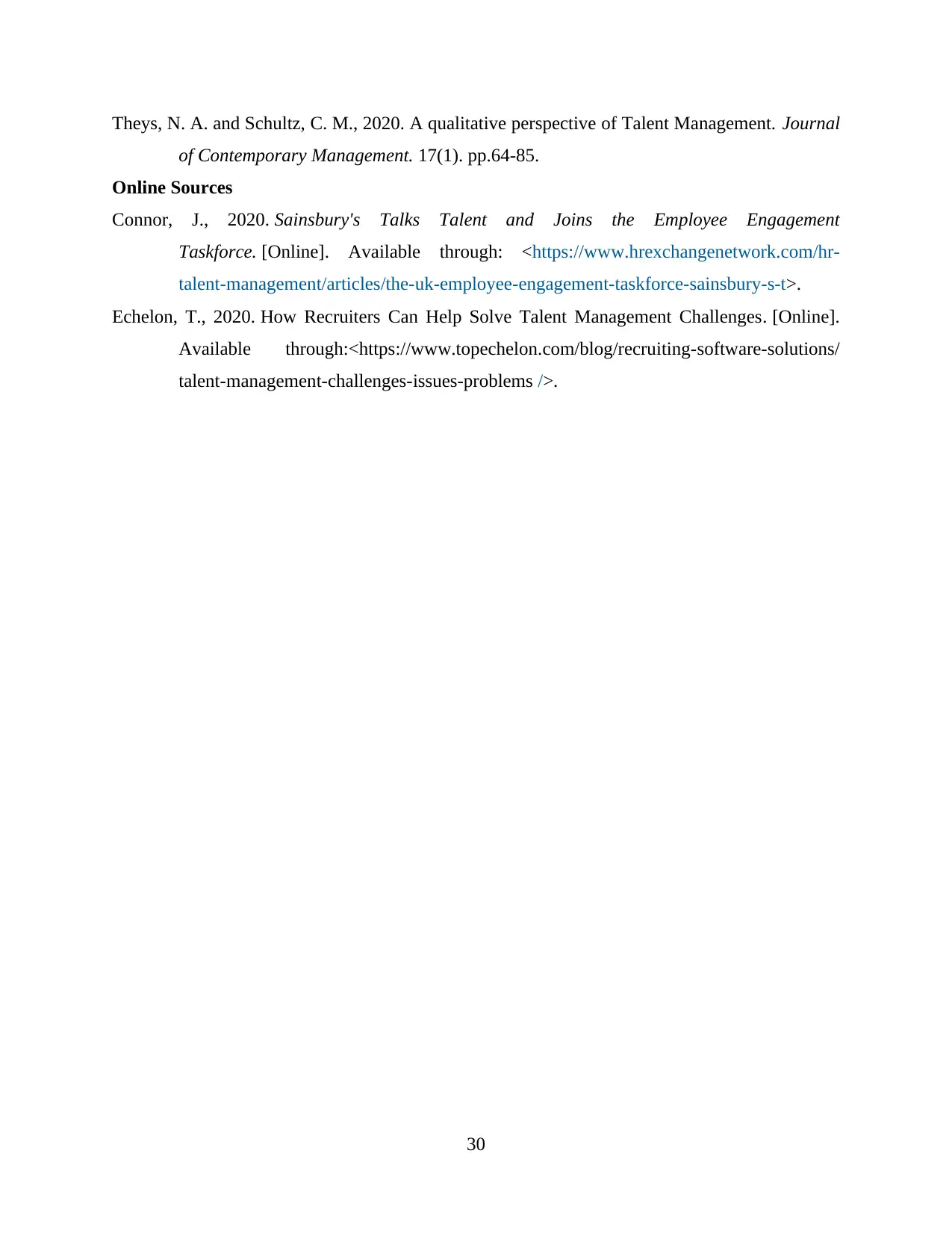
Theys, N. A. and Schultz, C. M., 2020. A qualitative perspective of Talent Management. Journal
of Contemporary Management. 17(1). pp.64-85.
Online Sources
Connor, J., 2020. Sainsbury's Talks Talent and Joins the Employee Engagement
Taskforce. [Online]. Available through: <https://www.hrexchangenetwork.com/hr-
talent-management/articles/the-uk-employee-engagement-taskforce-sainsbury-s-t>.
Echelon, T., 2020. How Recruiters Can Help Solve Talent Management Challenges. [Online].
Available through:<https://www.topechelon.com/blog/recruiting-software-solutions/
talent-management-challenges-issues-problems />.
30
of Contemporary Management. 17(1). pp.64-85.
Online Sources
Connor, J., 2020. Sainsbury's Talks Talent and Joins the Employee Engagement
Taskforce. [Online]. Available through: <https://www.hrexchangenetwork.com/hr-
talent-management/articles/the-uk-employee-engagement-taskforce-sainsbury-s-t>.
Echelon, T., 2020. How Recruiters Can Help Solve Talent Management Challenges. [Online].
Available through:<https://www.topechelon.com/blog/recruiting-software-solutions/
talent-management-challenges-issues-problems />.
30
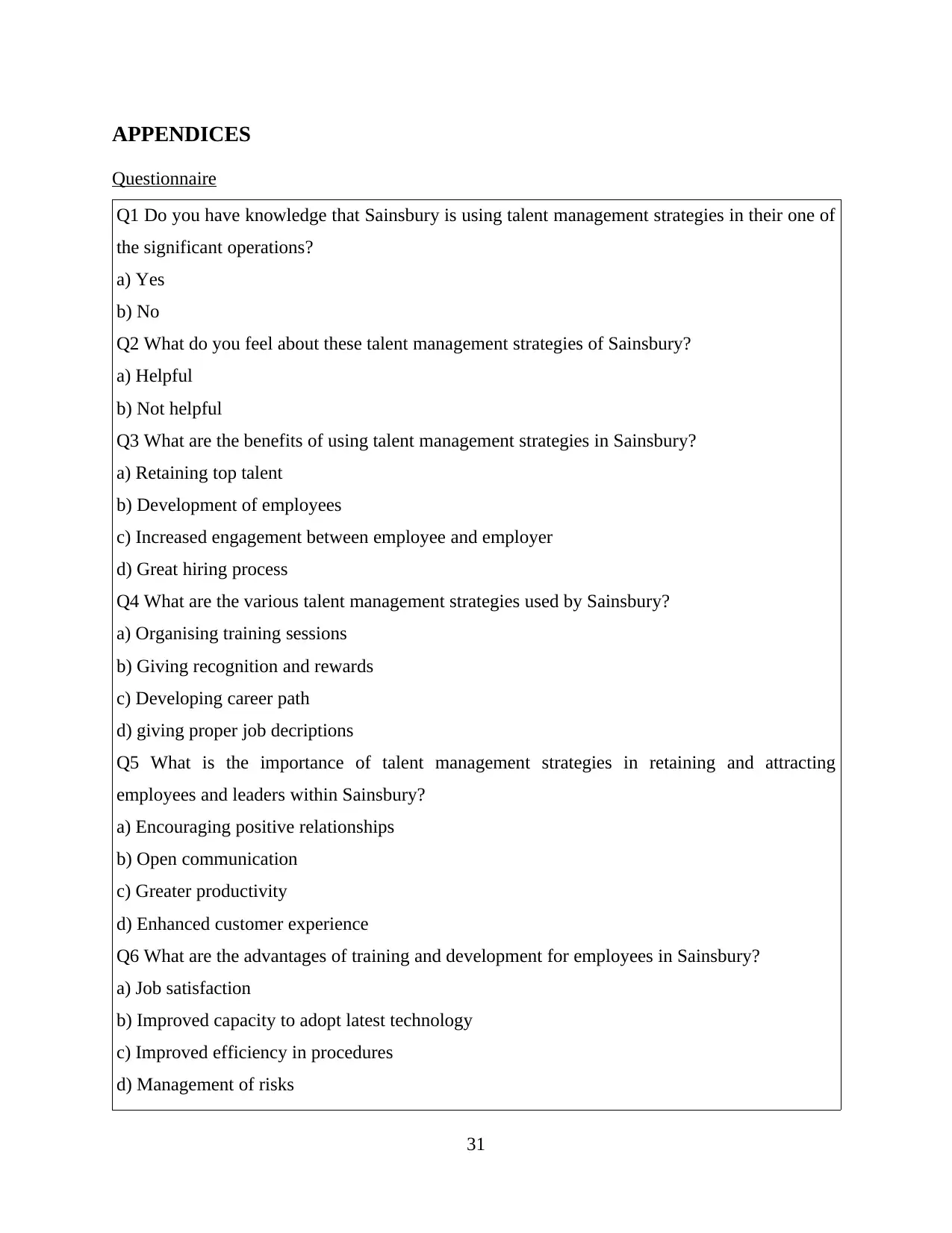
APPENDICES
Questionnaire
Q1 Do you have knowledge that Sainsbury is using talent management strategies in their one of
the significant operations?
a) Yes
b) No
Q2 What do you feel about these talent management strategies of Sainsbury?
a) Helpful
b) Not helpful
Q3 What are the benefits of using talent management strategies in Sainsbury?
a) Retaining top talent
b) Development of employees
c) Increased engagement between employee and employer
d) Great hiring process
Q4 What are the various talent management strategies used by Sainsbury?
a) Organising training sessions
b) Giving recognition and rewards
c) Developing career path
d) giving proper job decriptions
Q5 What is the importance of talent management strategies in retaining and attracting
employees and leaders within Sainsbury?
a) Encouraging positive relationships
b) Open communication
c) Greater productivity
d) Enhanced customer experience
Q6 What are the advantages of training and development for employees in Sainsbury?
a) Job satisfaction
b) Improved capacity to adopt latest technology
c) Improved efficiency in procedures
d) Management of risks
31
Questionnaire
Q1 Do you have knowledge that Sainsbury is using talent management strategies in their one of
the significant operations?
a) Yes
b) No
Q2 What do you feel about these talent management strategies of Sainsbury?
a) Helpful
b) Not helpful
Q3 What are the benefits of using talent management strategies in Sainsbury?
a) Retaining top talent
b) Development of employees
c) Increased engagement between employee and employer
d) Great hiring process
Q4 What are the various talent management strategies used by Sainsbury?
a) Organising training sessions
b) Giving recognition and rewards
c) Developing career path
d) giving proper job decriptions
Q5 What is the importance of talent management strategies in retaining and attracting
employees and leaders within Sainsbury?
a) Encouraging positive relationships
b) Open communication
c) Greater productivity
d) Enhanced customer experience
Q6 What are the advantages of training and development for employees in Sainsbury?
a) Job satisfaction
b) Improved capacity to adopt latest technology
c) Improved efficiency in procedures
d) Management of risks
31
Paraphrase This Document
Need a fresh take? Get an instant paraphrase of this document with our AI Paraphraser
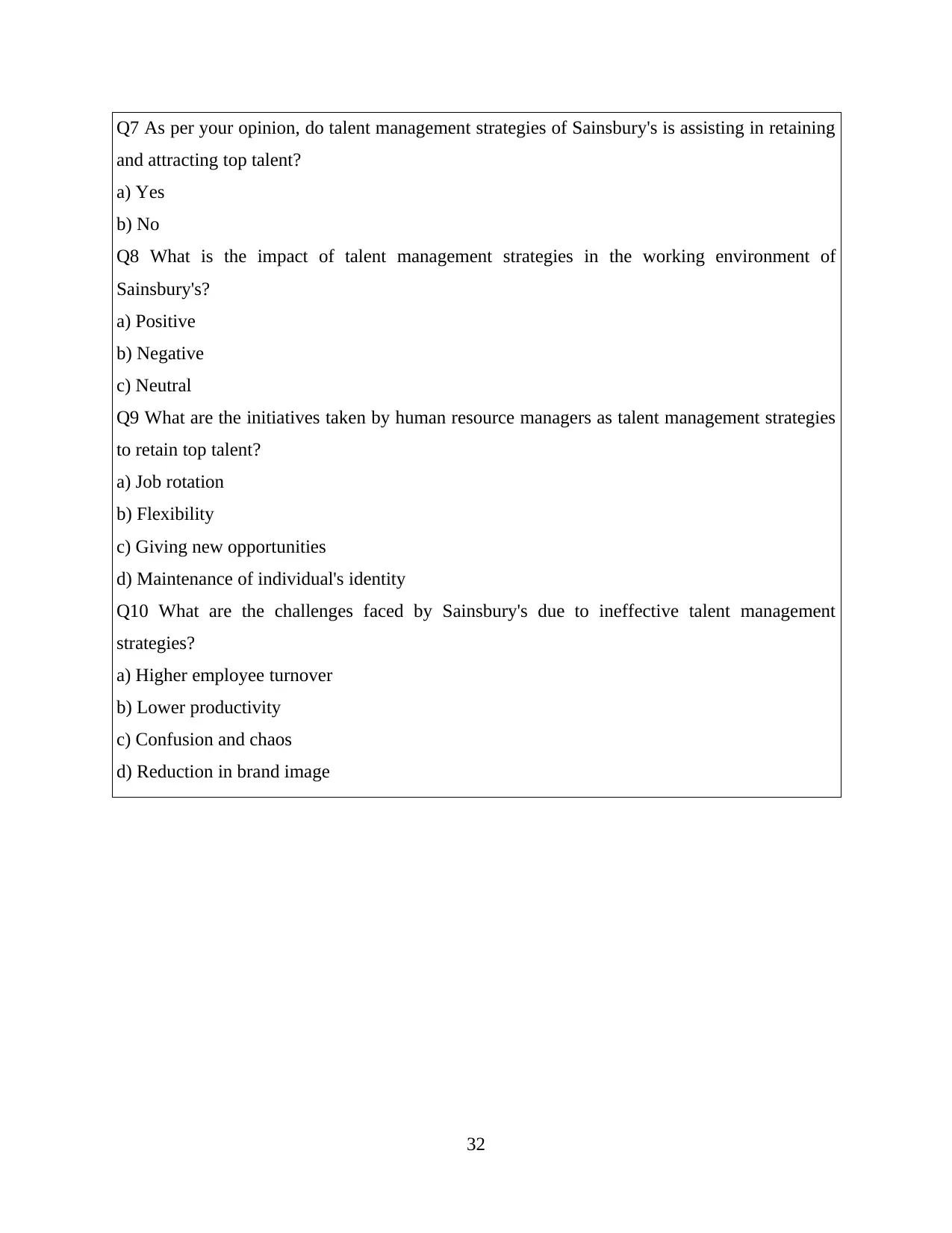
Q7 As per your opinion, do talent management strategies of Sainsbury's is assisting in retaining
and attracting top talent?
a) Yes
b) No
Q8 What is the impact of talent management strategies in the working environment of
Sainsbury's?
a) Positive
b) Negative
c) Neutral
Q9 What are the initiatives taken by human resource managers as talent management strategies
to retain top talent?
a) Job rotation
b) Flexibility
c) Giving new opportunities
d) Maintenance of individual's identity
Q10 What are the challenges faced by Sainsbury's due to ineffective talent management
strategies?
a) Higher employee turnover
b) Lower productivity
c) Confusion and chaos
d) Reduction in brand image
32
and attracting top talent?
a) Yes
b) No
Q8 What is the impact of talent management strategies in the working environment of
Sainsbury's?
a) Positive
b) Negative
c) Neutral
Q9 What are the initiatives taken by human resource managers as talent management strategies
to retain top talent?
a) Job rotation
b) Flexibility
c) Giving new opportunities
d) Maintenance of individual's identity
Q10 What are the challenges faced by Sainsbury's due to ineffective talent management
strategies?
a) Higher employee turnover
b) Lower productivity
c) Confusion and chaos
d) Reduction in brand image
32
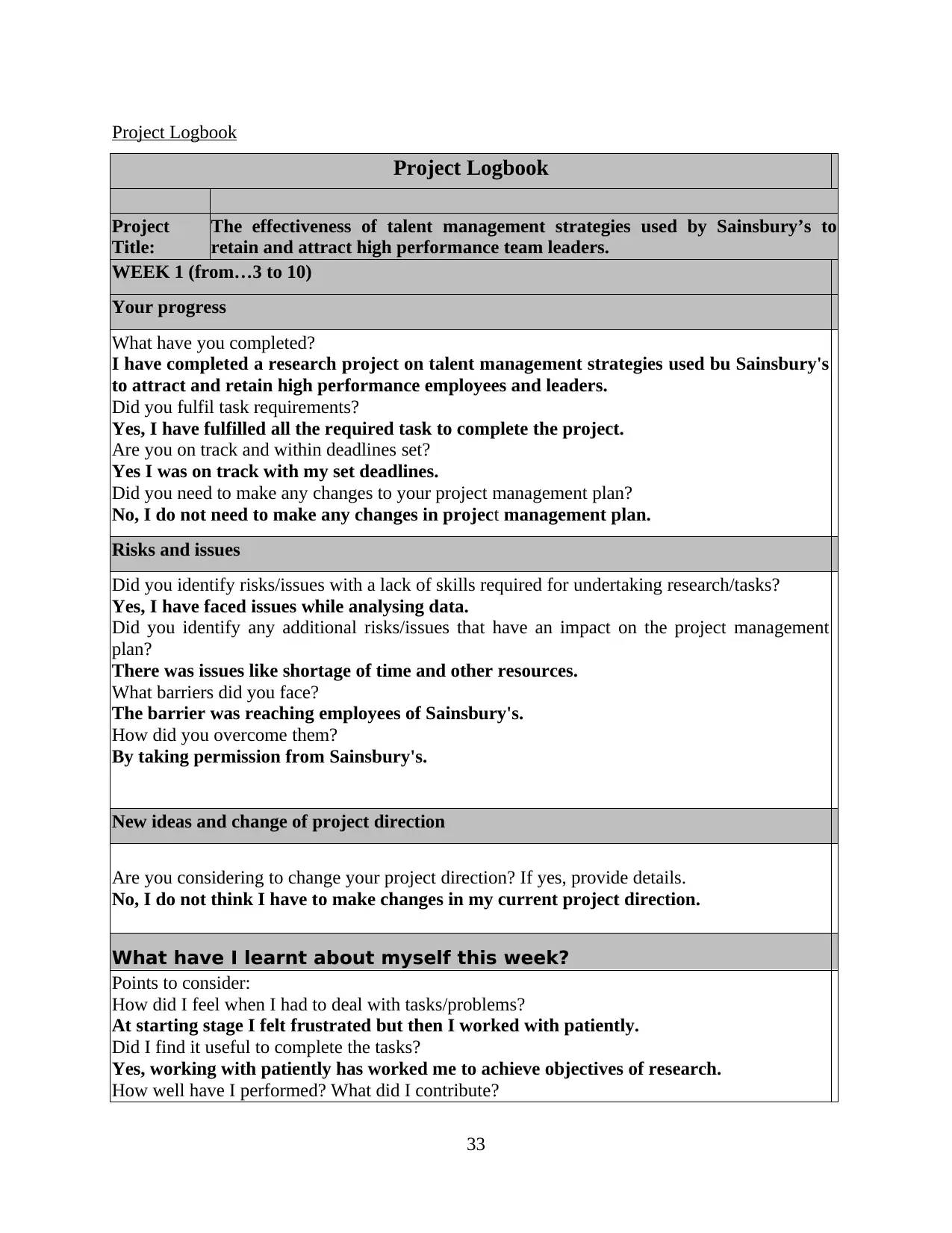
Project Logbook
Project Logbook
Project
Title:
The effectiveness of talent management strategies used by Sainsbury’s to
retain and attract high performance team leaders.
WEEK 1 (from…3 to 10)
Your progress
What have you completed?
I have completed a research project on talent management strategies used bu Sainsbury's
to attract and retain high performance employees and leaders.
Did you fulfil task requirements?
Yes, I have fulfilled all the required task to complete the project.
Are you on track and within deadlines set?
Yes I was on track with my set deadlines.
Did you need to make any changes to your project management plan?
No, I do not need to make any changes in project management plan.
Risks and issues
Did you identify risks/issues with a lack of skills required for undertaking research/tasks?
Yes, I have faced issues while analysing data.
Did you identify any additional risks/issues that have an impact on the project management
plan?
There was issues like shortage of time and other resources.
What barriers did you face?
The barrier was reaching employees of Sainsbury's.
How did you overcome them?
By taking permission from Sainsbury's.
New ideas and change of project direction
Are you considering to change your project direction? If yes, provide details.
No, I do not think I have to make changes in my current project direction.
What have I learnt about myself this week?
Points to consider:
How did I feel when I had to deal with tasks/problems?
At starting stage I felt frustrated but then I worked with patiently.
Did I find it useful to complete the tasks?
Yes, working with patiently has worked me to achieve objectives of research.
How well have I performed? What did I contribute?
33
Project Logbook
Project
Title:
The effectiveness of talent management strategies used by Sainsbury’s to
retain and attract high performance team leaders.
WEEK 1 (from…3 to 10)
Your progress
What have you completed?
I have completed a research project on talent management strategies used bu Sainsbury's
to attract and retain high performance employees and leaders.
Did you fulfil task requirements?
Yes, I have fulfilled all the required task to complete the project.
Are you on track and within deadlines set?
Yes I was on track with my set deadlines.
Did you need to make any changes to your project management plan?
No, I do not need to make any changes in project management plan.
Risks and issues
Did you identify risks/issues with a lack of skills required for undertaking research/tasks?
Yes, I have faced issues while analysing data.
Did you identify any additional risks/issues that have an impact on the project management
plan?
There was issues like shortage of time and other resources.
What barriers did you face?
The barrier was reaching employees of Sainsbury's.
How did you overcome them?
By taking permission from Sainsbury's.
New ideas and change of project direction
Are you considering to change your project direction? If yes, provide details.
No, I do not think I have to make changes in my current project direction.
What have I learnt about myself this week?
Points to consider:
How did I feel when I had to deal with tasks/problems?
At starting stage I felt frustrated but then I worked with patiently.
Did I find it useful to complete the tasks?
Yes, working with patiently has worked me to achieve objectives of research.
How well have I performed? What did I contribute?
33
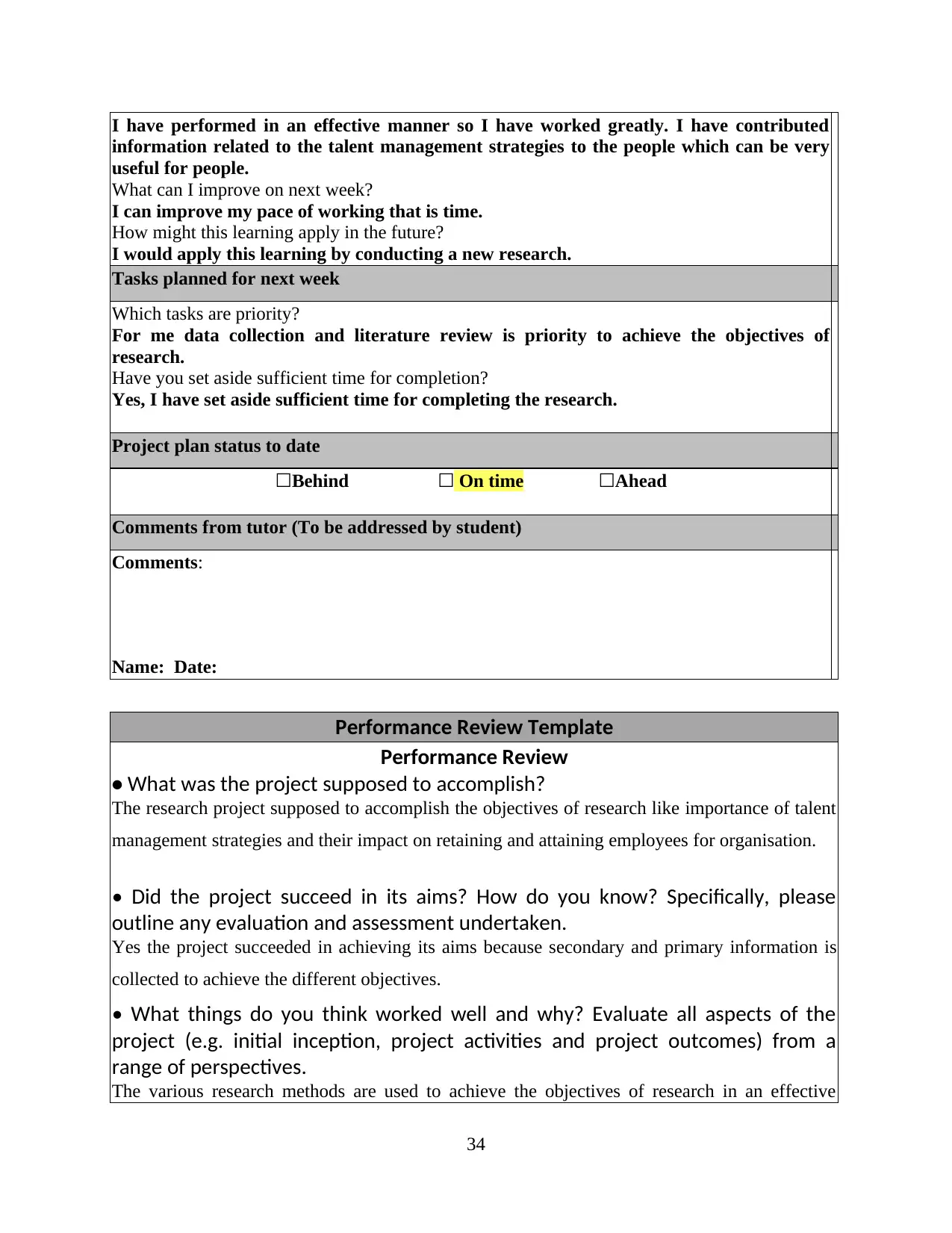
I have performed in an effective manner so I have worked greatly. I have contributed
information related to the talent management strategies to the people which can be very
useful for people.
What can I improve on next week?
I can improve my pace of working that is time.
How might this learning apply in the future?
I would apply this learning by conducting a new research.
Tasks planned for next week
Which tasks are priority?
For me data collection and literature review is priority to achieve the objectives of
research.
Have you set aside sufficient time for completion?
Yes, I have set aside sufficient time for completing the research.
Project plan status to date
☐Behind ☐ On time ☐Ahead
Comments from tutor (To be addressed by student)
Comments:
Name: Date:
Performance Review Template
Performance Review
• What was the project supposed to accomplish?
The research project supposed to accomplish the objectives of research like importance of talent
management strategies and their impact on retaining and attaining employees for organisation.
• Did the project succeed in its aims? How do you know? Specifically, please
outline any evaluation and assessment undertaken.
Yes the project succeeded in achieving its aims because secondary and primary information is
collected to achieve the different objectives.
• What things do you think worked well and why? Evaluate all aspects of the
project (e.g. initial inception, project activities and project outcomes) from a
range of perspectives.
The various research methods are used to achieve the objectives of research in an effective
34
information related to the talent management strategies to the people which can be very
useful for people.
What can I improve on next week?
I can improve my pace of working that is time.
How might this learning apply in the future?
I would apply this learning by conducting a new research.
Tasks planned for next week
Which tasks are priority?
For me data collection and literature review is priority to achieve the objectives of
research.
Have you set aside sufficient time for completion?
Yes, I have set aside sufficient time for completing the research.
Project plan status to date
☐Behind ☐ On time ☐Ahead
Comments from tutor (To be addressed by student)
Comments:
Name: Date:
Performance Review Template
Performance Review
• What was the project supposed to accomplish?
The research project supposed to accomplish the objectives of research like importance of talent
management strategies and their impact on retaining and attaining employees for organisation.
• Did the project succeed in its aims? How do you know? Specifically, please
outline any evaluation and assessment undertaken.
Yes the project succeeded in achieving its aims because secondary and primary information is
collected to achieve the different objectives.
• What things do you think worked well and why? Evaluate all aspects of the
project (e.g. initial inception, project activities and project outcomes) from a
range of perspectives.
The various research methods are used to achieve the objectives of research in an effective
34
Secure Best Marks with AI Grader
Need help grading? Try our AI Grader for instant feedback on your assignments.
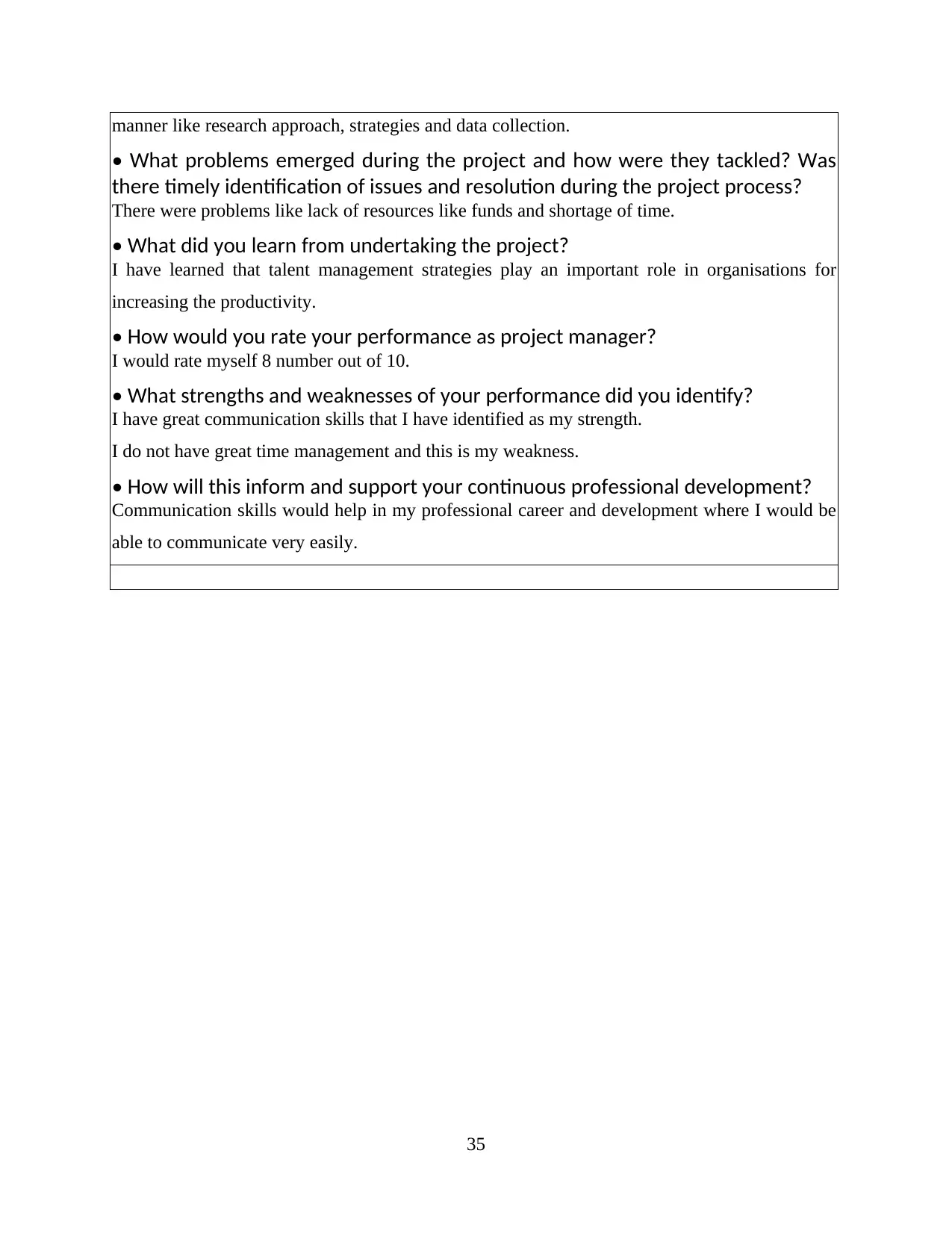
manner like research approach, strategies and data collection.
• What problems emerged during the project and how were they tackled? Was
there timely identification of issues and resolution during the project process?
There were problems like lack of resources like funds and shortage of time.
• What did you learn from undertaking the project?
I have learned that talent management strategies play an important role in organisations for
increasing the productivity.
• How would you rate your performance as project manager?
I would rate myself 8 number out of 10.
• What strengths and weaknesses of your performance did you identify?
I have great communication skills that I have identified as my strength.
I do not have great time management and this is my weakness.
• How will this inform and support your continuous professional development?
Communication skills would help in my professional career and development where I would be
able to communicate very easily.
35
• What problems emerged during the project and how were they tackled? Was
there timely identification of issues and resolution during the project process?
There were problems like lack of resources like funds and shortage of time.
• What did you learn from undertaking the project?
I have learned that talent management strategies play an important role in organisations for
increasing the productivity.
• How would you rate your performance as project manager?
I would rate myself 8 number out of 10.
• What strengths and weaknesses of your performance did you identify?
I have great communication skills that I have identified as my strength.
I do not have great time management and this is my weakness.
• How will this inform and support your continuous professional development?
Communication skills would help in my professional career and development where I would be
able to communicate very easily.
35
1 out of 35
Your All-in-One AI-Powered Toolkit for Academic Success.
+13062052269
info@desklib.com
Available 24*7 on WhatsApp / Email
![[object Object]](/_next/static/media/star-bottom.7253800d.svg)
Unlock your academic potential
© 2024 | Zucol Services PVT LTD | All rights reserved.




